#life is hard and we created a society that can be so cynical and were so busy all the time
Explore tagged Tumblr posts
Text
friendly reminder that if you wanna draw you should draw because I wanna see it and reblog it and eat it so it'll be with me forever
you MADE something!!! that straight up DIDNT exist before??? that's so incredibly metal and amazing and sick as fuck im so proud of you
#i dont care you 'skill level' or whatever nonsense#YOU DID THAT!!!#and my god you should be so proud because I am#i should get magnets to print out ppls art and put on my mini mini fridge that only holds like 4 cans of soda#but like esp if youre in you're 20s??? LATE 20'S???? PAST YOUR 20s???? HOLY SHIT IM SOO SO PROUD OF YOU#cuz its so so hard to get yourself to make and create after youre a kid or a teen#esp if you never really fostered that creativity as a young person#like you DID that you mADE that youre so so amazing#this also applies to writing and crafts and anything where you made something#like ive struggled for a long long time to like my art let alone want to make art but listen listen listen#everytime you make something it gets easier to make it again#you dont have to compare yourself you dont have to strive to draw like whoever#the secret is everyone wants their arts to look better or be better or easier even the really really talented professionals#we are learning creatures no one is perfect and its so so beautiful that that is a thing cuz like#i dont want to see beautiful rendered sistene chapel paintings everyday!!!#like theyre great and im in awe but i could be in awe and enjoying art jim bob down the street doodled on a bench#i see my partner doodle in my notebooks when they make phone calls and are on hold and i think its so beautiful#its just shapes but like they were there and they did that and I didnt? its beautiful and fun and reminds me they were there#you are here and im so glad you are because we get to enjoy things and create and love and just exist#life is hard and we created a society that can be so cynical and were so busy all the time#but i love us i love people i want so badly to love us all because we are different and dont always agree but we create and we exist#and i think thats enough at the end of the day. to just exist.#so you made a lil doodle? i want to see it because ive never seen it before and i think its so awesome genuinely that you did that#sucktacular sucks
6 notes
·
View notes
Text
if you would allow me to be sappy on main for a moment, i think there is something so powerful in choosing to fall in love with the world and with the human story.
i can't speak for everyone, but i know that i went through a period in my life where i was nothing but cynical and nihilistic about the world. i had convinced myself that nothing mattered, that if the world fell apart before my eyes it was what we deserved.
but here's the thing, cynicism isn't sustainable. you are never going to be able to find joy in this world if you convince yourself everything sucks and there's no joy to even be found in the first place.
yeah, sometimes the world does suck. sometimes all i want to do is curl up in a corner and sob because i'm violently scared that my loved ones won't come home safe because they dared to exist as themselves in this world. i cannot put into words the levels of fear i felt for my mom's safety during 2020/2021 when anti-asian hate spiked in the US, i worried everyday that she would not come home because how dare she exist as an asian woman in this country. when anti-trans legislation started picking up steam i was, and still am, scared for the safety of myself and all the trans people i know. the world sucks sometimes, people suck sometimes. but i refuse to let myself give up.
i want to believe in beauty of the world, i want to be able to revel in the fact that we are alive, that i am alive. and that our being alive means that we can create beauty and wonder and joy.
i get to enjoy the art that people create, because oh how special is it that we create art? that i can open my phone and read beautiful words crafted by people oceans and countries away. that i can bask in the beauty of the drawings and paintings people so kindly share with the world. that i can walk into a library and be surrounded by generations of stories that i have the privilege of reading. that i can go to a concert and experience the transcendence of live music.
but i also get to experience the beauty of nature. i get to watch as the clouds turn pink on my early morning drives to school. i get to take photos of the cherry blossoms in the few weeks that they turn pink in the spring. i get to look out my car window on a clear day and see the mountain grace us with her beauty.
i am alive. we are alive. why should we waste this life wallowing in cynical despair?
i have to believe in the world. i have to believe in the human story. i have to hold onto the hope that life is worth living and that things will get better. i am reminded of that hope every time i see art that makes me feel alive, every time i read a book or a poem or a story that makes me feel like being a human is a beautiful thing, every time a song transports me into a new world. i am reminded of that hope every time i talk to my friends and am reminded of why i love them so deeply. i am reminded of that hope every time i learn something new and feel the joy of new beginnings and new experiences wash over me.
i hope. and that is a powerful thing. it is a powerful thing to hope and to love and to believe. to hope for a better world. to love the world. to believe in the world.
a friend told me recently that i love and care for humanity fiercely and gently. and i think that's the root of it all. i don't just love my people, i love people. i love the human story, i believe in the human story, i have hope for our story.
it is powerful to love and believe and hope when you exist within a society that wants to beat you down. it is powerful to love and believe and hope when you are the "other" in the social order. it is powerful to love and believe and hope when you used to think you were not worthy of those things.
it's hard to love and to hope and to believe. but i have to, for my own survival. i have to allow myself to fall in love with the world. i have to allow myself to believe. i have to allow myself to hope. because for so long i didn't allow myself those things. and i think that is a powerful thing, that i can allow myself those things now.
#this ended up much longer than i'd intended#woops lol#i just love the world and the human story and art#love is powerful#hope is powerful#and don't let anyone tell you otherwise#love#radical hope#radical love#personal#musings on love#not good omens
58 notes
·
View notes
Text
«Adherents of the Peronist theory point to the curious number of incompetents, weirdos, and sexual abusers who have been brought into the pope’s favor. Doesn’t this suggest he likes to have people near him who depend on him utterly—a classic dictatorial strategy? […] One might also note that, in the manner of a true tyranny, strong institutions elsewhere have had to be destabilized or dissolved. The Order of Malta, the Latin Mass community, China’s underground church, contemplative religious houses, the Pontifical Academy for Life—wherever this pontificate finds something solid, it melts it into air.
But I hesitate over the dictator theory. Partly for sentimental reasons: There is no doubt that Catholics can criticize the pope under certain unusual circumstances, and no doubt that the current circumstances are well beyond unusual. Nevertheless, he remains the father of all of us Catholics, the direct descendant of St. Peter to whom the keys of the kingdom of heaven were given; and he deserves, not just my love, but the benefit of the doubt for as long as I can give it. And it is hard to believe so cynical an account of a pontificate which has at times been the opposite of cynical: above all, when the pope has returned to his great theme of “the throwaway society,�� his lonely stand against a global system which, from the sweatshops to the euthanasia clinics, treats the vulnerable not as the image of Christ but as useless trash. That magnificent critique will be one of his most significant legacies.
Will there be other positive legacies from this pontificate? I think we are obliged to pray that there will. As for the first decade, despite the mysteriousness that hangs around it, its legacy can be simply summarized: ten years which have destroyed a great deal and created almost nothing.»
— “Ten Years of Pope Francis”
6 notes
·
View notes
Text
The Struggle of Getting Back into Fiction Writing After ASD Self-diagnoses and Chronic Burnout.
Last year, I set aside writing Fantasy novels and focused on creating a gaming channel and figuring my life out after so many tumbling years of different things that happened in my life. Mental and physical health was and still is a huge contributor. But mainly, I ended up stumbling upon an issue that has plagued me since childhood, and that was, "Why am I so different from a lot of people I've met in my life? Why are certain tasks so difficult for me? Why doesn't it seem to improve? Why am I so anxious all the time? Why can't I focus? Why do I always get overwhelmed by minor issues, yet when major crises occur, I'm calm as hell?
It's obvious now I'm not neuro-typical. However, how far along the spectrum am I? Well, when I did a lot of research in a matter of days, I had a massive awakening to how different my mind is. Even though it was next to impossible to get a legit diagnosis, the self-diagnoses were enough for me to reevaluate my life. It has been a mourning process. Why? All my life, I was judged and even reprimanded for things that actually helped me cope with my already unhealthy environment. It turns out a lot of women are getting late diagnoses.
People assume that ADHD or ASD is on the rise because of ridiculous reasons, treating it like a plague that arose in our unholy modern society, but I really believe it has always been around. There's a whole issue in the first place of the studies done and on who to determine how to diagnose these conditions. ***cough...rich white boys*** But I won't dive into that.
So, girls like me...well... I'm a woman in my late 30s; back in the day, I was taught to act a certain way. Basically, pull off the performance of a lifetime. Try to lie, put on a fake smile or face, and not say certain things. I was told to not discuss specific topics and to walk on eggshells around dangerous people. Pretty much I was taught to become a submissive person, not to be outspoken, and to please people. I was taught to take abuse from employers and to just shuddup and work hard. This is how we survive. It would be nice to set boundaries, but I know first-hand that in a society with no social safety nets or power over policy, it's just being a fool in a lion's den. Therefore, this plays out even in my writing. I held back on my thoughts and true emotions. Even being open about my sexuality and me as a person was difficult. And when I did pursue my crazy, exhausting endeavor in writing and hiding behind a fake name, I let loose. I wrote some naughty, insane trash. This is on top of everything else I had obligations to in my life. Like working a legit job that was slowly breaking my body so I wouldn't starve or at least obtain a little bit of agency.
I used a lot of energy that I didn't have. That horrible Western hustle-grind mindset broke my mind. It's really not meant for me. I developed a speech impairment from it because I don't talk as coherently as I used to. Then, I learned burnout and grief can contribute to that, too. It also made me a bit more cynical than usual, and I'm spewing satire more than ever. But I've already accepted if my speech doesn't improve that, the damage is done; I'll just live with it.
This doesn't mean I won't pursue life to its fullest. Now, I have to be mindful of the output I do because my health got impacted in a way that it possibly won't ever heal or return to its original flavor of talking juicy. Maybe that's a good thing. I won't woo anyone with my voice anymore, like the snake charmer my supervisors used to call me. To think, if I use that to my advantage to never be summoned again to talk down an aggressive, abusive customer with no dang manners or morals. I don't have to listen to people venting their crap anymore when they should be paying to see a therapist. If they do have a therapist, they need to fire their ass and find a new one. End of story.
The moral of the story is I'm taking my time with getting back into my writing groove, and I'm managing my health as a self-diagnosed person on the spectrum. I'm giving myself grace. Now, I'm a changed human being with a new heart and mind to write more meaningful stories and not focus on being naughty as hell because I was oppressed for so dang long.
Dear readers, if you survived this blog and all my ranting. Thank you. Have a wonderful day, afternoon, or evening.
#personal rant#personal thoughts#personal blog#mental health awareness#health issues#burnout#neurodivergent#autism acceptance#adhd#auadhd#satire#darkhumor#lgbtq
0 notes
Text
The Erosion of Moral Integrity: Unravelling Ethiopia's Social Fabric
09 July, 2023
In Ethiopia, a country with a rich history and cultural heritage, the question arises: does the high moral and ethical code once embraced by preceding generations still exist in present-day society? It is no secret that Ethiopia, like many nations, faces significant challenges such as poverty, instability, corruption, and a loss of moral integrity. These issues are not limited to the government or the media; they have seeped into the very fabric of Ethiopian society. The erosion of moral integrity has far-reaching consequences that demand attention and action. This article delves into the multifaceted aspects of this moral decay, exploring its implications for the nation and emphasizing the urgent need for change. By examining the current state of Ethiopian society, we can gain a deeper understanding of the challenges it faces and the steps necessary to restore moral and ethical values for a better future.
Corruption and Distrust:
One of the most pressing issues plaguing Ethiopian society today is the alarmingly high levels of corruption that have infiltrated every level of the nation. Corruption has become so normalized that it is pervasive, with individuals prioritizing personal gain over the welfare of the majority. This widespread corruption has resulted in a sentiment of general distrust, eroding faith in both the government and society as a whole.
Fraud and illicit practices have permeated various sectors, from the public to the private sphere, causing significant harm to the nation's progress and development. The normalization of corruption has not only hindered economic growth but has also hindered efforts to alleviate poverty and improve the quality of life for ordinary citizens. Instead, resources are often misappropriated, benefiting a select few whiles leaving the majority of the population struggling to meet their basic needs.
The consequences of corruption extend beyond mere financial losses. They also extend to a growing lack of trust in institutions and the judicial system. With corruption deeply entrenched in every facet of the government, ordinary people have come to view government institutions with scepticism and cynicism. The erosion of trust in these pillars of society further exacerbates the challenges faced by the nation. Moreover, the lack of trust fueled by corruption presents a critical challenge, hindering government efforts to mobilize society to fight corruption collectively. When citizens perceive corruption as the norm, they may feel powerless and lose hope in effecting change.
The Fierce Competition and Loss of Values:
In the absence of moral integrity, Ethiopian society experienced a cutthroat competition where individuals prioritized personal success at the expense of common goods. The value of hard work diminished, and the focus shifted towards seeking the easiest path to success, often through embezzlement, corruption, and a lack of integrity and honesty. Genuine motivation to uphold moral values became increasingly rare, while hypocrisy, the motivation to appear moral while acting otherwise, became commonplace. Instances of officials misappropriating public funds and engaging in nepotism had eroded public trust and exacerbated the sense of moral decay in the country. This erosion of moral standards extended beyond interpersonal conflicts and permeated matters of propriety that were crucial for maintaining social order. The disregard for moral principles created an environment of social disorder, where individuals resisted internalizing standards that conflicted with their self-interest. As a result, unethical behaviour became prevalent, further eroding the fabric of Ethiopian society. Numerous reports and studies shed light on the extent of these issues in Ethiopia. Transparency International's Corruption Perceptions Index consistently ranked Ethiopia low in terms of perceived corruption, indicating the prevalence of corrupt practices within the government and other institutions. The World Bank's Worldwide Governance Indicators also highlighted concerns related to governance and accountability in the country.
The Politicization of Life and Moral Decay:
The politicization of life and moral decay in Ethiopian society is a complex issue with various factors at play. One significant factor is the growth of government intervention, which has had both intended and unintended consequences. Increased government involvement in the economy, community, and society has diminished the scope for private action, as individuals and businesses may feel constrained by excessive regulations and bureaucracy.
This can lead to a situation where political action becomes more rewarding and influential than pursuing private endeavours. When political action becomes more lucrative, it can attract individuals who are primarily driven by personal gain rather than a genuine commitment to public service and common goods. This phenomenon can create an environment ripe for corruption, as individuals seek to exploit their positions of power for personal benefit. Corruption undermines trust in institutions, hampers economic development, and perpetuates a culture of moral decay. Another consequence of the politicization of life is the exacerbation of ethnic polarization.
When politics become closely intertwined with ethnicity, it can fuel divisions and conflicts within society. Politicians may exploit ethnic identities for their own gain, stoking tensions and further eroding the moral fabric of the nation. Greed, inequality, abuse of power, and the erosion of moral values in public sectors are additional symptoms of moral decay resulting from the politicization of life. In a system where political connections and favours are valued over merit and fairness, greed can flourish, leading to unequal distribution of resources and opportunities. Abuse of power becomes more prevalent when accountability mechanisms are weakened, allowing those in positions of authority to act with impunity.
The impact of the politicization of life on the family unit should also be considered. Strong families are often the foundation of a healthy society, but when political considerations take precedence over moral values, the stability of families can be compromised. Family breakdown can contribute to social disintegration and further erode the moral fabric of society. It is important to note that the issues of politicization and moral decay are not unique to Ethiopia. History has shown that when political power is abused and moral values are compromised, societies across the world have experienced similar consequences. There are numerous examples from different countries and regions where the concentration of power, corruption, and moral decay have led to social and economic crises.
The Decline in Civility and Integrity:
The decline in civility and integrity in Ethiopian society is a multifaceted issue influenced by various factors. While it may not be accurate to solely blame the government for all societal ills, it is undeniable that high levels of government involvement, lack of good governance, inefficiency, and power abuse have weakened the economic and social fabric of the country. This has had a significant impact on the decline of civility and integrity. One crucial aspect contributing to the decline is the lack of accountability for those in power. When individuals in positions of authority are not held accountable for their actions, they may feel empowered to act without moral restraint. This loss of moral bearings within individuals can have far-reaching consequences, as it erodes the foundation of integrity in both public and private life. Moreover, the state's failure to promote incentives for moral conduct can further blur the distinction between right and wrong. When individuals perceive that unethical behaviour goes unpunished or is even rewarded, the motivation to uphold moral values diminishes. This erosion of moral standards contributes to a decline in civility and integrity within society.
Revitalizing Civil Society:
To address these challenges, it is essential to limit government intervention and revitalize civil society. More government involvement in everything is not the answer; instead, the focus should be on nurturing accountability and ethical standards. The task at hand is not to reinvent government or give politics new meaning; rather, it is to restore limits on government involvement and empower civil society. Government meddling only exacerbates the issues faced by the nation. In fact, excessive government meddling tends to worsen the challenges faced by the nation.
Revitalizing civil society entails strengthening non-governmental organizations (NGOs), community groups, and other grassroots initiatives. These organizations can play a significant role in addressing societal challenges, promoting civic engagement, and advocating for the rights and well-being of citizens. They can also serve as a check on government power and ensure that public officials are held accountable.
By limiting government intervention and empowering civil society, individuals and communities can regain a sense of ownership and responsibility for their own development. This approach encourages active citizenship, fosters innovation, and allows for a diversity of perspectives and solutions.
Consequences of Moral Decay:
Analysing the consequences of moral decay in Ethiopian society, it becomes evident that there are severe implications for the country's economic well-being. The loss of moral integrity has far-reaching effects on various aspects of the economy, leading to negative outcomes. One of the primary economic consequences is the occurrence of economic downturns. When moral decay is prevalent, corruption, embezzlement, and unethical practices become more common, undermining the efficiency and effectiveness of economic activities. Such practices divert resources away from productive sectors, hindering economic growth and stability.
Furthermore, high unemployment rates can be attributed to moral decay. When integrity and honesty decline, individuals may prioritize personal gain over fair employment practices. This can result in nepotism, favouritism, and a lack of meritocracy in the job market, limiting opportunities for qualified individuals and exacerbating unemployment levels.
Reduced access to basic necessities and increased poverty levels are also associated with moral decay. When corruption and embezzlement occur, resources meant for public welfare may be misappropriated or diverted, leading to a lack of essential services, infrastructure, and social programs. This, in turn, perpetuates poverty and inequality within society.
The lack of financial stability is another consequence of moral decay. When trust in financial institutions, markets, and governance erodes, both domestic and foreign investors become hesitant to engage in economic activities. This hampers investment stifles entrepreneurship, and slows down economic growth, negatively impacting living standards and overall prosperity. Moreover, moral decay contributes to social fragmentation and heightened inequality. When individuals prioritize personal gain at the expense of the common good, divisions within society deepen, exacerbating social unrest and tensions among different groups. This can have long-term negative effects on social cohesion, making it challenging to achieve sustainable economic development. The erosion of public trust in leaders and institutions also has economic ramifications. When citizens lose confidence in their government and institutions due to widespread moral decay, political instability ensues. This instability disrupts policy-making processes, inhibits long-term planning, and deters foreign investments, further impeding economic progress. The breakdown of key societal institutions, such as the legal system, law enforcement, and governance structures, weakens the foundations necessary for economic growth and stability. In the absence of strong institutions, corruption and unethical practices persist, hindering business transactions, impeding contract enforcement, and deterring foreign direct investment
The Impact on International Reputation:
The loss of moral integrity in Ethiopian society has a significant impact on the country's international reputation. When a society is perceived to be in a state of moral bankruptcy, it jeopardizes its standing among other nations. This can have far-reaching consequences for diplomatic relations, trade, and foreign investment. One of the key impacts on international reputation is the erosion of trust and confidence in Ethiopia's ability to honour agreements. When moral integrity is compromised, doubts arise regarding the country's commitment to fulfilling its obligations and upholding ethical standards. This can lead to strained diplomatic relations with other nations, as they may become hesitant to engage in agreements and partnerships with a country seen as lacking in moral integrity. Trade disruptions are another consequence of the loss of moral integrity. When a country's reputation is tarnished due to widespread corruption, embezzlement, and unethical practices, it raises concerns among trading partners. They may question the transparency and fairness of business dealings, leading to trade barriers and reduced trade volumes. This can have detrimental effects on the economy, hindering economic growth and development. Foreign investment is also affected by the loss of moral integrity. Investors seek stable and ethical environments to ensure the security and profitability of their investments. When a society is perceived to be morally bankrupt, foreign investors may hesitate to invest in the country, fearing a lack of transparency, corruption, and an unstable business environment. This can impede economic development, as foreign direct investment plays a vital role in stimulating growth, creating jobs, and transferring technology and knowledge. Furthermore, the loss of moral integrity can result in negative perceptions and judgments from the international community. It can lead to a tarnished image and reputation for the country, affecting its standing in international forums and organizations. This may impact the country's ability to influence global agendas, participate in international initiatives, and access international aid and support.
In conclusion, the erosion of moral integrity in Ethiopian society has far-reaching consequences that demand attention and action. The prevalence of corruption, embezzlement, and unethical practices has undermined trust, hindered economic growth, and perpetuated social inequality. The loss of moral values has led to economic downturns, high unemployment rates, reduced access to basic necessities, and increased poverty levels. Moreover, the erosion of moral integrity has strained diplomatic relations, disrupted trade, and deterred foreign investment, tarnishing Ethiopia's international reputation. Addressing these challenges requires a comprehensive approach that involves promoting accountability, transparency, and ethical standards within both the government and society. It is essential to combat corruption, strengthen institutions, and restore trust in the judiciary and law enforcement. Revitalizing civil society, empowering grassroots initiatives, and fostering a culture of integrity are key components in rebuilding the social fabric of Ethiopian society. Lessons can be learned from experiences in other countries that have successfully tackled moral decay and its economic consequences. By drawing upon relevant information and examples, Ethiopia can develop effective strategies to restore moral and ethical values, rebuild its economy, and regain its position as a respected member of the international community. The journey towards restoring moral integrity will not be easy, but it is necessary for Ethiopia's future prosperity and well-being. Through collective efforts from the government, civil society, and individuals, Ethiopia can rebuild its social fabric, restore trust, and create an environment that fosters integrity, economic growth, and social cohesion.
0 notes
Text
Christmas Movies Ranked by How Anti-Capitalist They Are
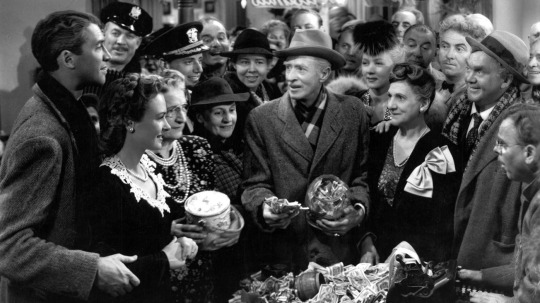
It’s a Wonderful Life
Movies that make you want to pick a fight with the 1% and also weep with joy. Absolutely a classic and anti-capitalist at its very core. Will convince you we need to start oppressing landlords again.
“Just remember this, Mr. Potter, that this rabble you're talking about... they do most of the working and paying and living and dying in this community. Well, is it too much to have them work and pay and live and die in a couple of decent rooms and a bath? Anyway, my father didn't think so. People were human beings to him. But to you, a warped, frustrated old man, they're cattle.”
SAY THAT!!! George Bailey said fuck landlords, all my homies hate landlords, they have NO rights. Local man believes poor people are human, dedicates his life to helping them, and in his time of the need literally the whole town comes together to support him and his family. Class solidarity ftw!
“Remember no man is a failure who has friends.” Bitch I CRY EVERY GODDAMN TIME.
10/10
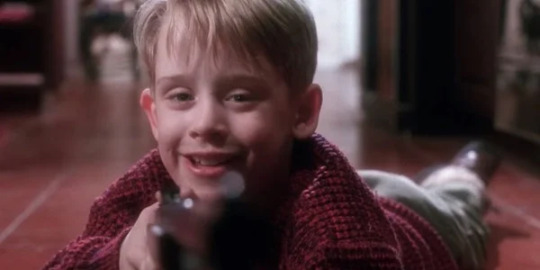
Home Alone
Soundtrack goes hard, the wacky hijinks even harder.
Loses points because the bandits had a prime opportunity to seize and redistribute some of the wealth from this ritzy Chicago neighborhood and instead they focus their energy on trying to kill an 8-year-old who outsmarts them at every turn.
2/10

Elf
A family favorite in our house. Touches on the overworking and mistreatment of employees through Greenway Press – Walter forced to choose between being with his family on Christmas Eve or losing his job, it’s implied Deb has a pet grooming business on the side to makes ends meet despite being a receptionist at a NY publishing company, etc.
Honestly most of the points come from Jonie’s underrated yet highly relatable storyline. She works in retail, exhausted and cynical towards the high-paced Christmas season which gives her little to no relief or reward, since she’s surviving on ramen noodles and using the employee showers because her water was cut off. Not expanded on enough to be considered a true Marxist piece but the effort is appreciated.
5/10
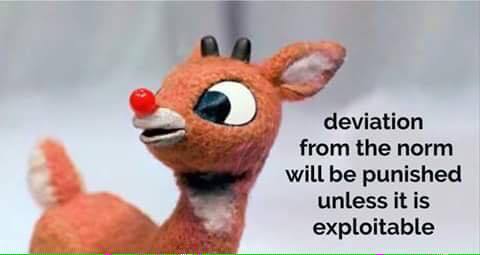
Rudolph the Red-Nosed Reindeer
Although the meme is correct in that Rudolph’s red nose becomes desirable only once it proves to be useful, it does get points for exposing the harmful nature of forced conformity and those alienated by these capitalist ideals -- Rudolph, Hermie, the island of misfit toys -- are given a place to belong despite the perceived “flaws” that before made them undesirable.
Also the elves definitely have a free dental-plan now thanks to Hermie and are hopefully on their way to unionizing. Fucking superb you funky little misfit.
6/10
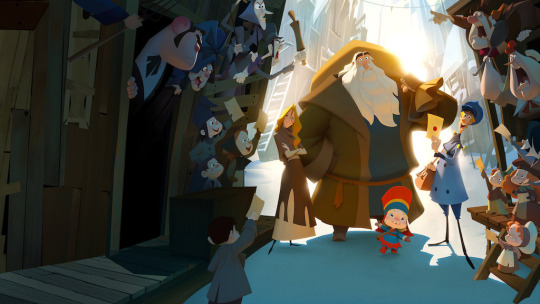
Klaus (2019)
Turns a member of the bourgeoisie into a man I’d trust to carry my mail. Respect for postal workers this movie contains was ahead of its time.
No direct takedown of the establishment but a heartwarming message -- “A true selfless act always sparks another” bITCH I may be crying -- that emphasizes the importance of giving to others even when there is no selfish motivation to do so, which is inherently anti-capitalist.
8/10
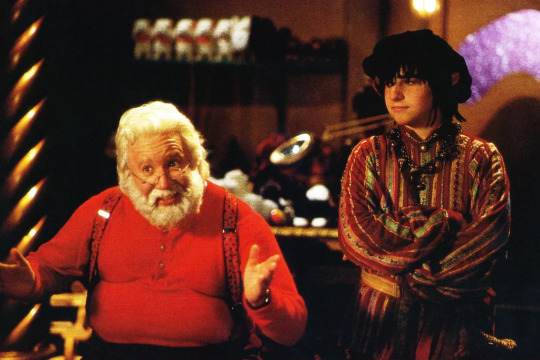
The Santa Clause
Scott Calvin starts as a toy executive who takes part in the commercialization of Christmas. He was probably a business major so automatically loses points.
The Santa dynasty itself seems to operate under the cutthroat rules of the business world where you must overthrow (or in this case, throw him off the roof) the former CEO in order to seize power.
Elves have not unionized or seized the means of production by the end.
0/10
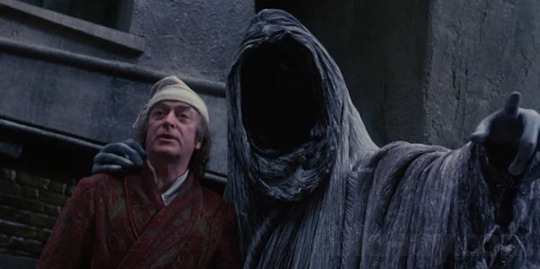
A Christmas Carol
THE ORIGINAL. Charles Dickens was not even in the neighborhood of fucking around with this one. CREATED the anti-capitalist Christmas genre!!
Rich man treats his employees like shit and gets terrorized by three ghosts on Christmas Eve. Force him to redistribute his wealth by dragging him through a montage of his most epic fails -- oh, hey, remember when your fiancé left you? -- and make him listen as all his employees and relatives complain about his stingy ass.
They end this slideshow by throwing this dude into his own grave. DIRECT ACTION.
Like damn, the ghosts really said, “If you hoard your resources and ignore those in need when you could directly improve/save lives with no cost to yourself, you will die ALONE and you WILL pay for your crimes in hell.” Literally watching this movie is a catharsis for anyone who is or has been poor and working class.
I’m including all versions of this movie but a special shout out to the Muppet version because it fucks the hardest.
100/10
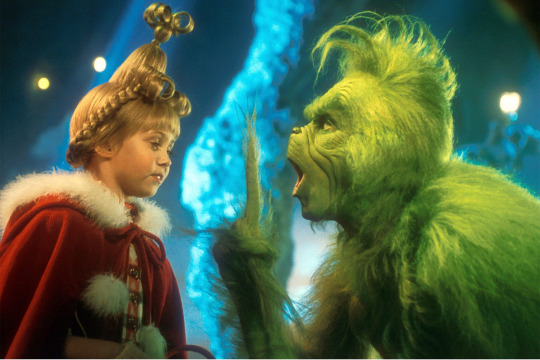
How the Grinch Stole Christmas (2000)
Listen I’m not even in realms of joking with this one. This movie is THE anti-capitalist film of the holiday season.
WhoVille commercializing Christmas and a fixation on consumer culture to the point where anything and anyONE who cannot be commodified -- aka the GRINCH -- is alienated? The Whos rediscovering that people should be cherished over material items once it all is stolen and they must confront how empty the holiday has become??
Cindy Lou becoming disillusioned in Christmas -- at an age that coincides when many children (those who celebrate Christmas at least) lost belief in Santa and had to wrestle with what the holiday means with the magic gone and they’re more aware of the rampant consumerism that taints the season?? Her resolve to find a meaning that goes beyond material consumption because if a holiday founded on goodwill doesn’t extend that goodwill to everyone, even those society deems undesirable, then what’s the point???
The Grinch despising Christmas because he is unable to participate and isolated from the Whos and also the better qualities within himself? His alienation serving to demonize him further as it allows the public to narrow his valid criticisms of the holiday down to him being different and thus inherently predisposed to evil?? And hmm isn’t it interesting that a LOT of this demonization comes via Mayor Augustus “generously paid for by the tax-payers of Whoville” Maywho, Mr. 1% himself.
The upper vs working class divide evident in the light show competition between Martha May and Betty Lou Who?? The opening scene of the shopping frenzy that mirrors our own consumerist culture and overworking of retail/poster workers??? This entire monologue:
“That's what it's all about, isn't it? That's what it's always been about. Gifts, gifts... gifts, gifts, gifts, gifts, gifts! You wanna know what happens to your gifts? They all come to me. In your garbage. You see what I'm saying? In your garbage. I could hang myself with all the bad Christmas neckties I found at the dump. And the avarice... the avarice never ends! ‘I want golf clubs. I want diamonds. I want a pony so I can ride it twice, get bored and sell it to make glue.’"
MARXIST KING. MENTION IT ALL.
1000/10
#christmas#christmas movies#how the grinch stole christmas#a christmas carol#elf#klaus#rudolph the red nosed reindeer#home alone#it's a wonderful life#the santa clause#this was a labor of love please clap
14K notes
·
View notes
Note
Can we get some more about Captain?
Life was filled with choices.
Some were remarkably easy to make, like choosing what he wanted for dinner or picking which book to settle down with for the evening.
Other choices he made were much, much harder.
Like loving you.
That has always been a hard choice.
A part of him would argue it was never really a choice of his own to fall in love in the first place, but rather the involuntary monster instinct of his soul being drawn to its most compatible match in order to create a strong bond and even stronger children…
…but even that was only a small part of this very complex equation he found himself struggling with for a long, long time.
No, perhaps the hardest part of loving you was undoubtedly how easy you made it for him to love you.
By all accounts he should have never really fallen for someone like you in the first place.
You were kind.
Friendly.
Dependable.
Someone he would’ve normally seen as weak and easily to manipulate for his own ends.
Sans, Captain of the Royal Guard, would’ve just strung you along with empty words and false promises before crushing you underfoot when you were no longer useful to him.
It was that kind of sentiment he grew up with in a kill or be killed world where monsters were like roaches and needed to be completely squashed beyond dusting to make sure they wouldn’t just arise from the grave with a plan for vengeance.
But he wasn’t in his underground anymore.
Nor was he Captain of the Royal Guard.
At the time when the two of you met, he was just Sans.
Tired and broken, Sans.
He had spent so long being a cold unmoving tyrant, enacting the will of his Queen without a moment's hesitation or shred of remorse, that the part of him he had shut away for so long just wanted to break free now that he was free from his title and on the surface.
…But then he was crushed underfoot.
The surface that they had dreamed of for so long was nothing but a new layer of hell they had clawed their way up to, with new rules and new structures that were in place to make them suffer.
Worst of all they were stripped of everything.
Status, money, power.
They took it all and left them to rot within the city just like the rest of the garbage.
Fighting his way out of that just left him.. tired.
Tired of struggling.
Tired of feeling like garbage.
Tired of having to spend each and every day toiling about and writhing in the mud just trying to prove that he was worthy of life!
….
It was because you were so bright and so kind that it made him want to open up to you so easily. You were just so.. different from the regular scum of humans he had found himself associating with once he surfaced. They were all cynics and convicts, ready to discard and use each other up without a single shred of hesitation just to get a better foothold in society.
Just like how he was in the Underground..
You, on the other hand, always had a hopeful shine in your eye that things would be better tomorrow than they were today. You truly believed that both humans and monsters could find commonality and work towards a peaceful future together, one built on community and happiness.
You refused to let go of hope in this hopeless town.
What a fool you were.
….and what a fool was he, for choosing to fall in love with such a foolish fool of a person.
Maybe that’s why he fell for you so easily?
Because you were both idiots.
Sans’ fingers reached out to gently brush away a few strands of hair from your face, drawing out a sleepy mumble from your lips.
Well, if he was a fool then so be it.
He’d gladly be the biggest damn fool every day for the rest of his life if it meant getting to spend his time with you like this.
It was peaceful and quiet, with nothing but the lulling sounds of the ocean and your gentle breaths to keep him company as the two of you sat outside on the deck wrapped under a quilt.
The sun was threatening to peek over the horizon beyond the edge of the sea and cast away the darkness of night.
Once more Sans was presented with a difficult choice.
Should he wake you so that the two of you could watch the sunrise like you planned? Or should he let you snooze away some more so he could keep indulging himself and admire your cute sleeping face?
Hmmm.. choices.. choices..
Well, he knew if he let you sleep past the sunrise he wouldn’t hear the end of it. You huff and stomp around, complaining in that cute frustrated tone of yours as you’d scold him for not waking you. Maybe he’d be able to sweet talk his way out of it? You were always so easy to win back over with the promises of breakfast and affection.
On the other hand he always wanted to spend moments like this with you. It gave him a chance to rest his weary soul and for a brief moment believe that maybe today will be better than yesterday..
Hmmmmmmm…
Well, it seems he’s decided.
“..DARLING..”
“…mmmm..”
Oh, you were making this such a hard choice to follow through with when you make a face like that.
“…..DAAARLING..”
“…mmrgmmm..”
“DARLING. ANGEL. SWEETNESS. LIGHT OF MY LIFE AND TREASURE OF MY HEART AND SOUL-“
“mmm! Sans.. Sans..! Ehehe..! SANS!”
You giggled as he kissed you some more on the neck, having punctuated his every word with a small smooch until you were squirming in his grasp to get away from his ticklish advances. He smiled, deciding to grant you a bit of mercy before you tangled yourself up anymore in the blanket and instead gently nuzzled you closer.
“..What..?” you asked drowsily, happily leaning into his touch.
“THE SUN HAS ALMOST RISEN,” he said gently.
“I.. know… I was.. awake..”
His brow bone raised questionably for a moment before a sinister grin spread across his face.
“MY MY, FIRST THING IN THE MORNING AND YOU’RE ALREADY CHOOSING TO LIE TO ME MY DARLING DEAREST? YOU CERTAINLY ARE A GLUTTON FOR PUNISHMENT.”
“I-! I-I’m not! I was awake!”
“REALLY? I DON’T EVER RECALL HEARING YOU SNORE WHEN YOU’RE AWAKE…”
He watched as your eyes darted around to anything and everything besides his face before you smiled brilliantly, and guilty, at him.
“I was.. breathing.. deeply..? You know like uh… meditat-YAAH!!”
You squirmed and squealed as he tickled you, trying your best to catch his wrists but to no avail.
“FOR SHAME DARLING, YOU KNOW BETTER THAN TO LIE TO ME,” he hummed. “PERHAPS YOU THOUGHT YOU WERE STILL IN YOUR DREAMS WHERE YOU COULD GET AWAY WITH SUCH A THING?”
“N—No! I-I just..! Pfft ahahahaha! I’msorry! Eheheheheh!! I’msorrySans! Pleaaaseee! Stop!”
“YOU’VE MADE YOUR CHOICE DARLING, NOW YOU MUST SUFFER THE CONSEQUENCE!”
“Aah!! Dammit!! Sans!!!”
A shame the two of you missed the sunrise and you wrestled about on deck, but that was alright. There would be plenty more the two of you would be able to watch together in the future. For now he was more than satisfied with his choice as the two of you laughed breathlessly, tangled in each other’s embrace as the light of the morning sun washed over you.
check out my other writings | feel free to drop me a ko-fi!
#captain!sans#sans#undertale#swapfell#swapfell sans#sans x reader#reader insert#undertale au#wickedtale#alch!writes#something cute and fluffy#to get me back in the swing of writing things
142 notes
·
View notes
Conversation
RP Meme from "Chapter One: The Bad Old Days" in the Bone Gnawers book from "Werewolf: The Apocalypse" Part 2 of 2
"Soon you’ll be blind to the world around you!"
"Oh, and then there was the long-discarded ideal of actually giving a shit about the human race. Remember that?"
"We fought to defend everyone, before we became so damn cynical and skeptical."
"It is our pleasure to serve. And it is a pleasure to entertain you."
"Look at this poor sap. Living off garbage. Sleeping in the street in that smelly cloak."
"What’s so great about being homeless?"
"For what? Money? Power? Privilege? For nothing."
"They say we’re cowards, bastards, lazy, selfish, or worse. Don’t buy it."
"Let me be straight; I’m not dumb enough to try to save
everyone."
"Most folks aren't worth saving."
"The world is corrupt, so people are corrupt."
"Ninety percent of everything is crap, including humanity."
"It’s like a big garbage dump."
"I can’t just laugh off the world."
"My world is different."
"In my world, when I walk down the street, no one looks me in the eye. They lock their doors. They keep their distance."
"People on the sidewalks reach out for help, and all they get is nothing."
"I don’t want to play the fool."
"It’s up to us. It’s time we acted up."
"You’re only a bum if you want to be a bum.
"You want to be a hero? Get to work."
"We had to save the world."
"The meek were set to inherit the Earth, but they were going to get dirt unless they took what they needed."
"We fought for anyone that had been cast out, kept down, or ripped off."
"Clearly the next taleteller has an edge, or perhaps a bit of influence in the right place."
"Quit your growling!"
"Okay, so maybe it went a little easier on us."
"Women laying down with wolves to mate with them, bearing their spawn. Men breeding with beasts in animalistic rites. Stalking demons showing up in the dead of night to claim their children from human parents."
"Millions suspected of witchcraft and heresy writhed on the flames of bonfires."
"No more finding food for the hungry to eat. No more protecting places where the homeless could sleep."
"Cowardly freak."
"Humans found the remains, stripped of flesh and gnawed to the bone."
"No matter where we came from, we came together in America."
"We’ve fought for a lot of ideals, as you can tell, and we’ve certainly suffered when they’ve failed."
"This time, we wouldn’t take the cowardly way out."
"In a sense, the war almost became a game to us — a deadly, glorious game."
"Sweet, glorious freedom."
"If we didn’t have a place of our own in Europe, then we’d have to make a home in America."
"Because we fought for it honorably, we felt like we’d earned it."
"Fair play is the American way, after all!"
"But right now, you’re on my turf!"
"We each tell the story to serve our own ends."
"Maybe I’m just proud of who I am. You got a problem with that, pal?"
"Ancient and powerful undead stalked the corridors of Versailles. Tainted vampires took obscene pleasure in sipping the blue blood of the French nobility. Evil ancients remained content to maintain their facades of power and privilege."
"And we don’t do that sort of thing, do we? Well, do we?"
"They didn’t understand what we were fighting for!"
" And then again, maybe we should have paid less attention to human society and more to our own."
"But if your lot in life involves getting humiliated on a regular basis, it’s time for a change."
"You see, we’ve been cast out and kicked out and beaten up over and over again, but we never gave up, and we never give in."
"Some bit of hope or foolishness kept us going, and enough of us believed in it back then that it started to make a difference."
"If we weren’t good enough for the old traditions, we’d make up new ones."
"And remember, anyone can be a success if they work hard enough!"
"When the Romanovs lost power, the people surged up to retake what was rightfully theirs."
"Hey! I ain’t no Commie! But I got a lot of sympathy for anyone who’s been beaten down for so long."
"Sometimes you have to survive any way you can."
"Someone preaches a high ideal, we do the hard work, someone else reaps the rewards."
"You keep fighting until you win."
"If everyone works, everyone wins."
"You were still a hero."
"We didn’t want to die; we played to win."
"So where the hell are we?"
"Drunk off our asses and freezing cold."
"We should get involved."
"How is the world going to end?"
"Or is the Apocalypse just the dawn of a new age, where everything’s going to be created all over again?"
"I live here and now!"
"I’m alive, and I’m going to stay that way, no matter comes my way!"
"We’re gonna survive, even if we have to scavenge the bones of the carcass of the world!"
"Look into the flames! That is what the world will look like, and soon!"
"THE END OF THE WORLD IS HERE!"
"Life in the shadows continues."
#rp meme#rp memes#rp starters#roleplay starters#roleplay meme#roleplay memes#owod#wta#Werewolf the Apocalypse#World Of Darkness#bone gnawers
19 notes
·
View notes
Text
The metanarrative’s grand narrative: Osomatsu-san’s characterization throughout the franchise
The growing cynicism throughout the entire Osomatsu-san franchise shows itself in season 3 with more prominence than anything prior. I think that’s pretty common amongst any “long-running” gag comedy - replacing a plot with spiteful commentary that’s admittedly pretty hit or miss at times. However, it invariably creates a negative but pretty funny character growth, and I love the way the show (I’m including the movie too as “canon” material considering season 3 has referenced it way too many times for me to disregard) has set up this metanarrative across seasons. Long post ahead.
Obviously, Osomatsu-san is self-aware and has a casual relationship with itself. No linear plot (though S3 seems to be trying it out and I’ve enjoyed it - I love that they’re willing to experiment), rather a collection of unrelated skits; and so it points out its own metanarrative because of this “lack of consequences.” With comedy comes impermancy and Ososan AND -kun will always bounce back from that week’s insanity. From the Oxford Dictionary, a metanarrative is “a narrative account that experiments with or explores the idea of storytelling, often by drawing attention to its own artificiality.” Basically: a story about stories.
On top of this, is what I’m calling the “grand narrative,” which is often used interchangeably with metanarrative, but here I’m making a distinction to make it less confusing. Of course, Ososan is a story about stories, but with that comes a story it’s not directly telling, which is where most of the (little) character development is taking place. This is what I’m going to call the grand narrative of a show whose premise is being a meta-aware comedy. I’ll admit I’m by no means an expert on these subjects, but storytelling methods are something I enjoy trying to analyze. As a media format, Ososan really utilizes the fact that it’s a tv show.
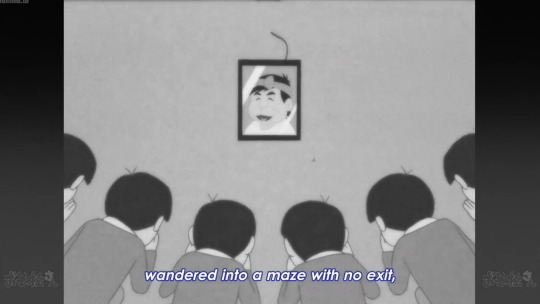
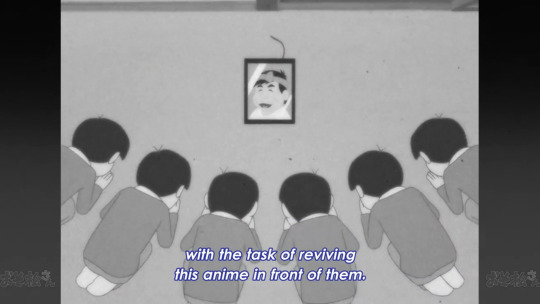
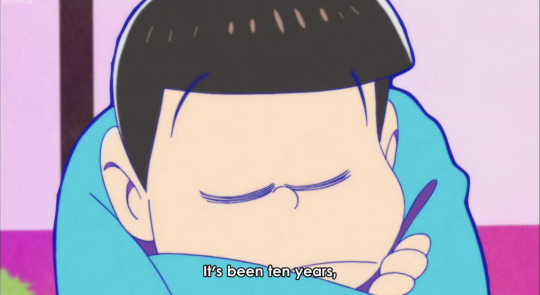
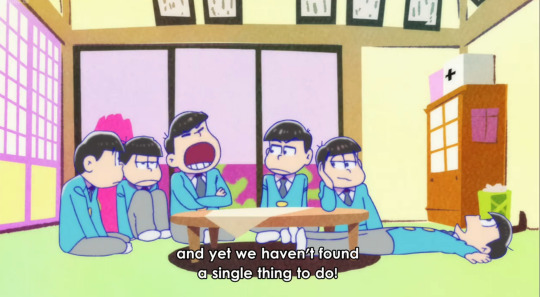
Right off the bat S1E1 makes it clear what to expect: Nothing. Not a damn thing. But, the show had already been cleared for this first season, so it has to be produced. This same episode’s preview is done by Osomatsu, which I’m just gonna quote instead screenshot because there’s too many.
“...we plan on properly starting the anime the next episode.” “...you ended up with an extra minute, so you need me to do something to fill it?! Actually, is this anime going to be okay with episode one being like this? I’m getting worried about how the rest of this is going to be...” “There, I used up a minute! [EPISODE ENDS]”
Episode one is not only batshit referential, but downright mocking the state of anime in 2015. Which, truthfully, I don’t have much to comment on in that regard, as I’m not an avid anime fan. However, it does this under the premise of being indecisive about what kind of anime they wanted the Osokun reboot to be.
They’ll do just about anything to stay popular and relevant considering that is, quite literally, all they have going for them as characters in the series and just being characters in general. They may be pieces of shit, but they’re likeable pieces of shit. The dynamics they’ve built upon to be entertaining is encouraged, and they’re basically just roleplaying different skits and fucking around.
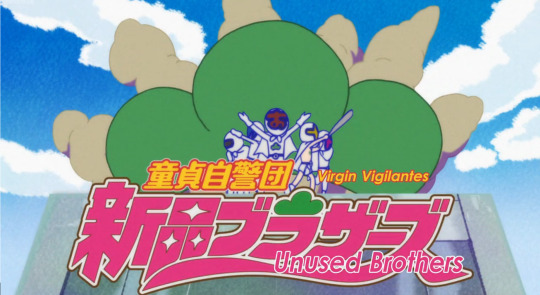
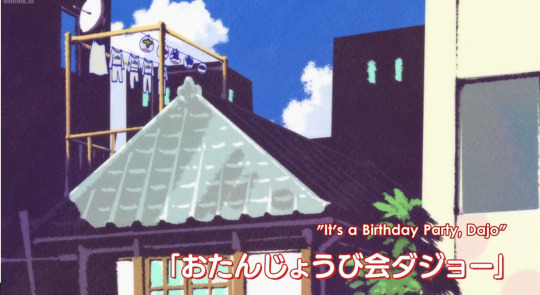
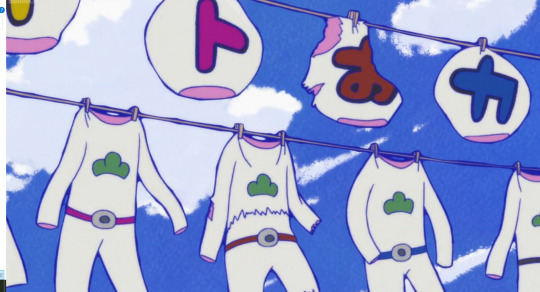
All the AUs! All the skits! They’re just playing! They’re just fuckin’ around!! They couldn’t come up with any interesting plot nor could they “graduate” from being anime protagonists and join the real world, so they just fuck around and make a gag anime!
Even if we follow both as the audience, the show makes a difference between the what’s them in their “normal life” (crazy begets crazy, no?) and what’s their “show.” But, really, that’s just one way to look at it, as they don’t really follow any rules as a show. I could say the Joshimatsus are separate characters from the sextuplets, and it’d be a “correct” interpretation. It doesn’t really matter - I’m choosing to examine it all as being the six of them just running around and playing, because being entertaining and having fun is all they know as characters. Besides, having it blended together beyond recognition reinforces how it prioritizes entertaining us, the audience, above logic. Storytelling doesn’t need to make absolute spatial-temporal sense for it to be enjoyable to fans.
In any case, that mentality really seems to be what pushes their character development negative, as they look to reinforce habits and rituals despite them being really detrimental for them in the long run. They know they’re popular characters as is, and with really everyone from staff to fans encouraging this behavior further, so they see no point in fixing what isn’t really broken.
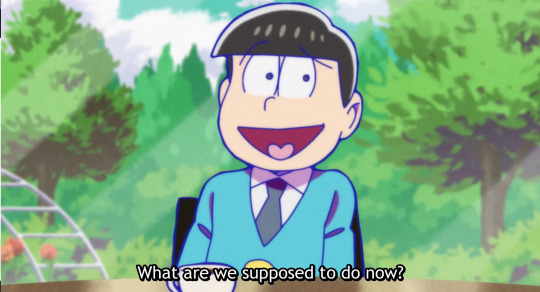

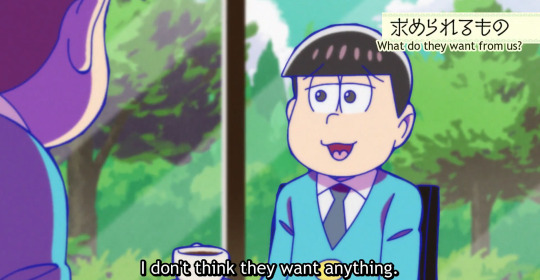
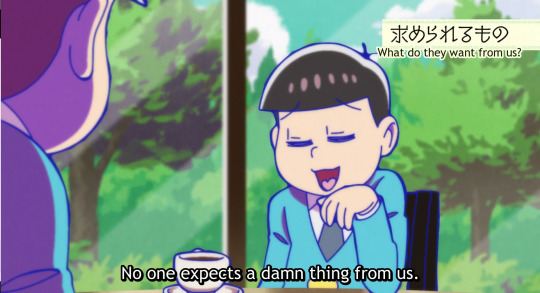
I found this 4 year old article from Manga.Tokyo discussing the Ososan phenomenon in Japan because while the craze died off pretty quickly in American anime circles (which deserves a whole other post), Japanese fans went fuckin’ nuts.
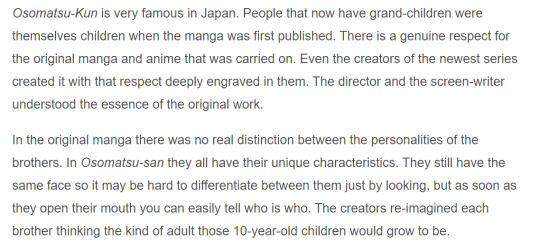
This portion caught my attention, as it makes sense that entitled and enabled asshole children would grow up to be entitled and enabled asshole adults. The article also goes on to compare them to idols (even beyond the F6 spoof) and that they are rooted in being comfort characters above all else.
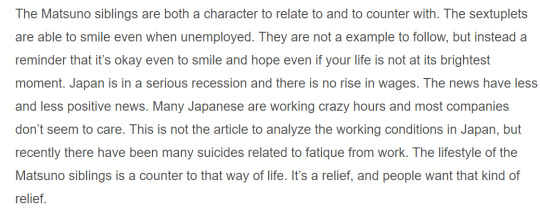
It’s worth a read, especially because Japanese fan response is what drives majority of the content post-S1, and, inevitably, ties into their character development.
They know that they’re Characters, particularly Protagonists. You know what happens to protagonists? Everything works out. Just about every single story created has stuff working out for protagonists. In fact, we have a whole genre made that separates stories with bad tragic endings from our Normal Stories. Ososan is a comedy, not a tragedy, so surely there’s gonna be some payoff somewhere along the road, especially as the seasons and other content are still being pumped out. To a self-aware, entitled, enabled protagonist, assuming everything is just gonna work out for you isn’t that far off from your narrative truth.
However, Ososan is a gag anime, and a lot of gag content (like 4koma mangas) is dropped for other projects before any emotional cathartic ending is provided for characters and fans alike. So, three seasons and a movie later, nothing has happened. It’s a great idol cash cow with a Family Guy filter, and the characters (and writers) don’t even bother to hide it anymore. And I know I’m being hypocritical concerning my definition of “canon material” but I think this portion from one of the drama cds “Choroplex” basically summarizes my point:
CHOROMATSU: Wait, don’t make this into a gag! You don’t even care about becoming employed, right? KARAMATSU: There’s no way that could happen... CHOROMATSU: What kind of future are you imagining? Is it nothing but this? [HUGE PAUSE BEFORE THEY MOVE ONTO SOMETHING ELSE]
They’re parodies of themselves and are running out of ideas. Stagnation and decay is normal, if not unavoidable, at this point in time for them. They’re just 20 somethings who’ve hit a wall but they’re too scared and insecure to bring about permanent positive change. It’s easier for them to fall back into normal patterns and joke off the rest.
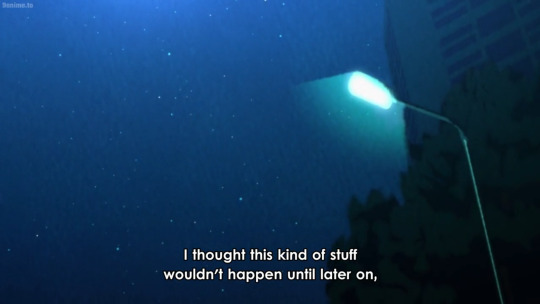
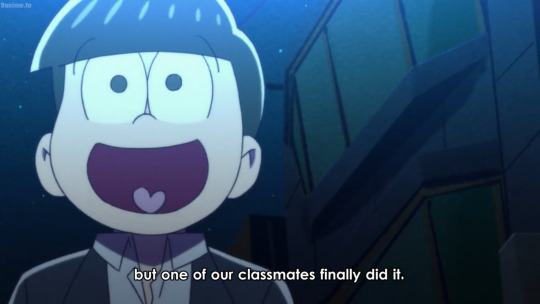
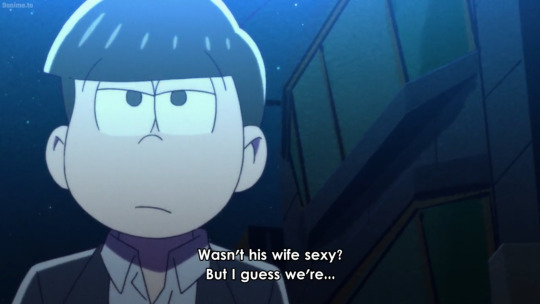
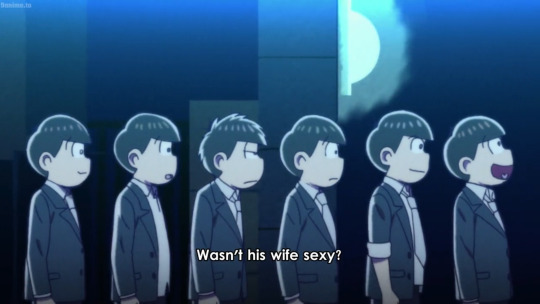
They have an antagonistic relationship with expectations. They can’t handle a single iota of expectations, or responsibilities. They’ve never needed to worry before, so why bother now? Once the biggest hits on the block, now they’re just guppies in the ocean, and there’s nothing they believe themselves to be able to accomplish to keep up with this big brave new world. This is epitomized in S3E15, where old man Osomatsu tells a bastardized version of the Tortoise and the Hare, blatantly projecting his feelings onto it. Again, too many screenshots so let me pull more quotes (bolding for my own reference):
“The place that the tortoise thought was the goal was not actually the goal. His journey down the road of life still continued on. The tortoise was quite tired, but he continued running anyway.” “No one actually knew who was in front anymore. There are too many people above you.” “After the tortoise found out how society worked, he thought, ‘So this is the difference in talent? No amount of hard work is going to fix this. All right. I’m done competing with others.’”
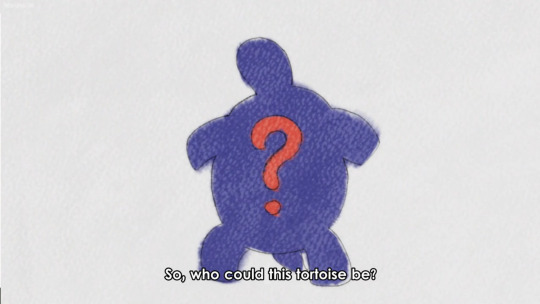
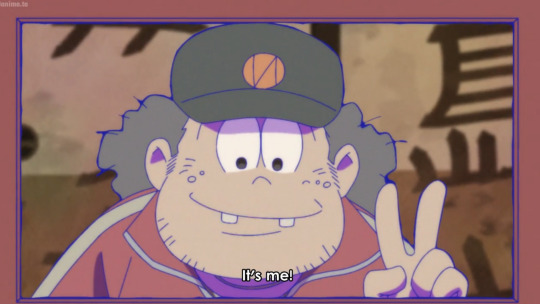
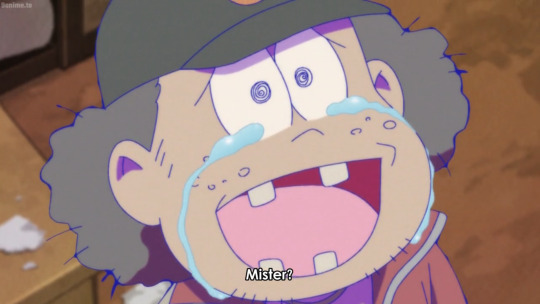
S3 has left more questionable endings than its counterparts. The last 2 skits I referenced don’t even a gag to them, and the marriage skit doesn’t play music for the entire second half of S3E5. There’s more involved too. I haven’t even brought up the rice ball twins becoming actual entertainers in their universe, or how they introduced this whole AI subplot only to reject it because All Six Of Them aren’t interested in expanding their little corner of the world. Here’s a transcript of the ending preview from S3E1:
“Hey, hey, Osomatsu here. I thought we were saved from being replaced, but I guess we get new characters next week. Man, we’re busy. New encounters, changing surroundings... We’re NEETs to begin with because all that is a pain. I guess a lot can happen after three seasons. [EPISODE ENDS]”
The sextuplets’ mindsets are extremely self-centered, which is also an environmental thing (the parents don’t even really care that they’re NEETs, for one) and an understanding of what they ought to be (epic successful protagonists). They also have a very black and white mentality, all or nothing. They’re extremely sheltered, and once they realized where they stood in society at large, they just gave up. To them the world is divided between winners and losers, and somehow, “inexplicably,” they found themselves to have fallen from grace. But they’re protagonists, that has to count for something! Everything’s gonna end up okay, right? Well... what this show has told them: No, not at all. They are consistently compared and warned of Iyami, and are perfectly aware of this fact, and have come to internalize it as a truth rather than a reversible self-fulfilling prophecy.
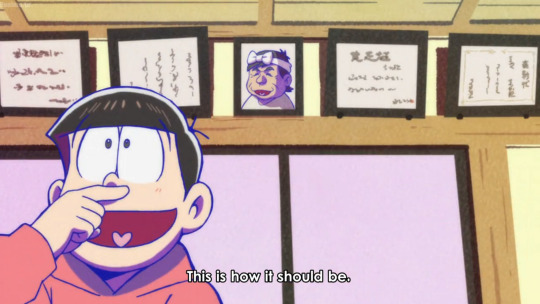
Too many screencaps, taken from the S3S5 marriage discussion:
JYUSHIMATSU: I wonder if we’re gonna get married someday, too. CHOROMATSU: Well, I mean... probably? I’m not exactly sure, but... TODOMATSU: What? You’re gonna get married, Choromatsu-niisan? CHOROMATSU: Huh? Well, yeah... someday.
Surprise! They have commitment issues! The same group that couldn’t commit to a fucking plot! Though their personality issues have several factors involved, I can’t overlook the theater motifs abound. Life’s a stage, and they’re performing entirely unscripted and it shows.
Do I think all of this is 100% intentional on the writers’ part? No, probably not. There’s also an extra layer here regarding contemporary Japanese commentary that I’m not familiar with, so I just ended up focusing on the characters. I can’t be in the writers’ heads, but whatever decisions are being made by executives regarding censorship and “compliance” are reflected in these character changes that result in being significantly more bitter and defeatist.
In the all or nothing, winner-take-all mentality, the only way to save face at this point, in their minds, is to own up to it - act like it’s what they wanted all along. And, hey, it’s funny to watch, right?
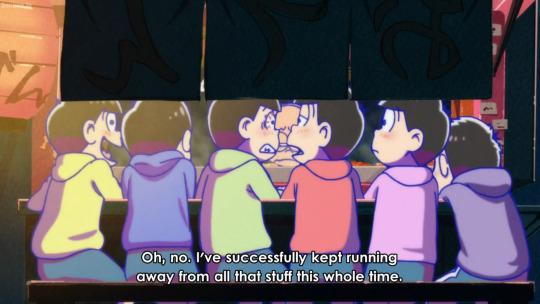
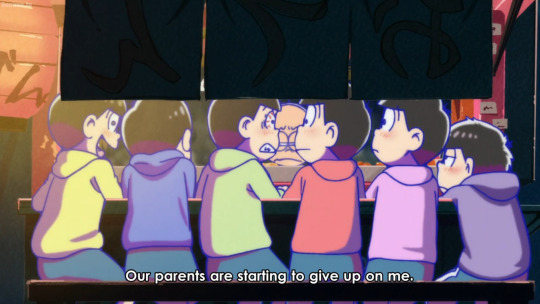
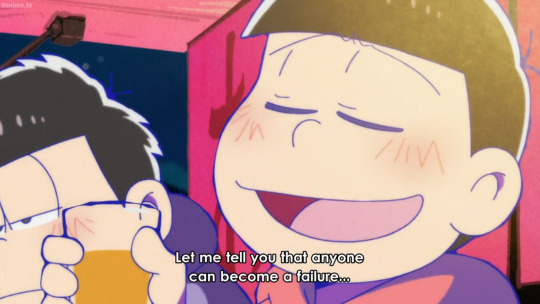
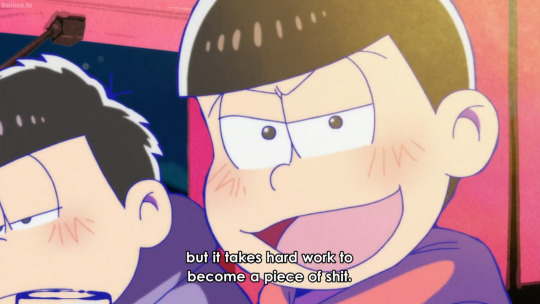
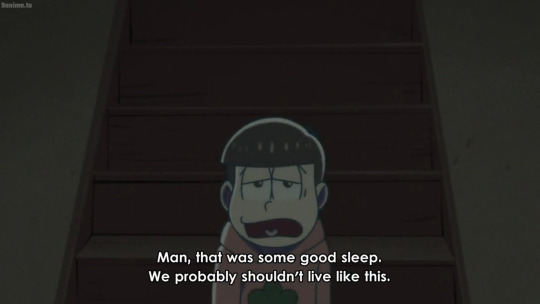
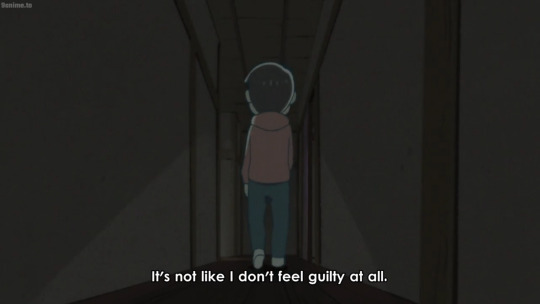
“Why is Osomatsu all my examples”, you might be asking. Well, he’s the damn blueprint for it all. The leader of the bunch, the first personality to grab your attention, has had all his issues projected and ricocheted in their echo chamber.
Ultimately, my point here is that you could think their “canon characterizations” (though canon means nothing in a show like this) as being intertwined with the nature of their self-aware existence. They’ve shown you all their tricks, the smoke and mirrors are getting boring, and they’re stalling long enough the story seems to be moving on without them - in spite of them. And when something genuinely threatens their way of life, they don’t know how to respond.
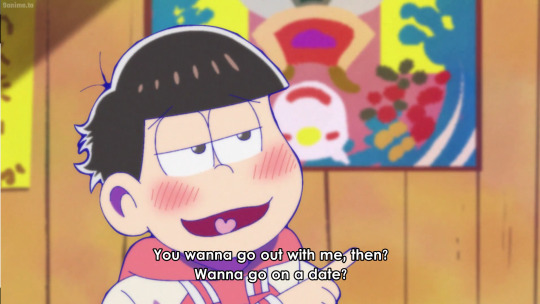
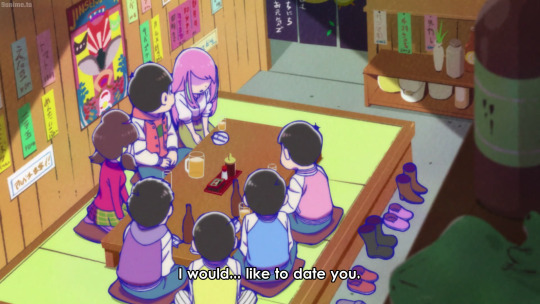
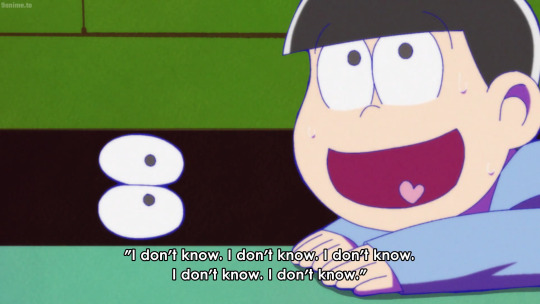
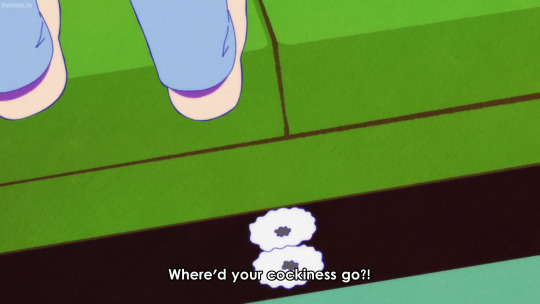
You can play it all straight, of course. Remove the meta jokes and all the same plot points can be hit, but, as a slapstick comedy, it’s able to easily add this additional layer in that I appreciate. I’ve said it in my last post and I’ll probably say it in more, but with comedy comes sincerity - the caveat of all the cartoon violence is that, on some level somewhere, this is how they really feel.
#osomatsu san#osomatsu#karamatsu#choromatsu#ichimatsu#jyushimatsu#todomatsu#osomatsu matsuno#karamatsu matsuno#choromatsu matsuno#ichimatsu matsuno#jyushimatsu matsuno#todomatsu matsuno#analysis#confession this was sparked by a convo i had w friends about s3e18#this is a bit truncated but i couldnt bring myself to make this longer#maybe ill make a pt2 or whatever idk
118 notes
·
View notes
Text
WHAT MAKES A PERSONALITY
A template for analyzing features of a personality beyond listing adjectives.
For Fáfnir, I’m working to bridge what we see in canon with what kind of person he might be without the Crown’s influence. This template will have [canon] → [current TOA]
SELF-CONCEPT
View of Self: Hard-working and ambitious, able to achieve the impossible through his own strength and skill. Fáfnir balks at the idea of relying on anyone or anything else, including the gods, and his “unaided” accomplishments feed his sense of superiority. He’s better than everyone around him and he has the resume to prove it. He is the savior that will pick up the pieces and finally drive Niðavellir out of its old-fashioned practices and its commitment to the status quo. There’s nothing he can’t do. → A nobody. A toy given a false life for someone else’s entertainment. A fool and a monster. He questions what he has achieved himself, and whether he’s capable enough on his own in his day-to-day. Uncertain and empty, stuck in a purgatory between two lives, neither of which feel like his own anymore. Broken. Avoids questions about himself. View of Others: Most people are weak-willed and aimless, in need of something to unite them and give them purpose. Only few - like himself - possess the innate qualities of a leader, and it has no relation to whether or not one is born into the role. Without them, society would stagnate and crumble, as it has in Niðavellir. Likewise, the sheep do not make the shepherd and if they could speak, it would only be gratitude to the shepherd for gathering and protecting them from the wolves. Prior to attaining the crown, Fáfnir still believed that there was something that set him apart from others - some sort of spark or drive that compelled him to climb the ranks of the military and fill the then-unoccupied throne while everyone else in Niðavellir was content to stew in their misery. → He is closer to the weak-willed and aimless than he ever thought he was, and it frightens him. Was Eitri’s manipulation of his life confirmation that the sheep can never be the shepherd? While it may not be innate leadership qualities that set him apart from others now, Fáfnir still feels great distance between himself and those around him, which is likely by his own doing. Even more cynical toward those in power now. His sympathy for the plight of the common folk remains unchanged though, as he has always believed that people suffer as a result of their so-called leaders (among which he realizes he now sits). View of World: An awful place run by awful people. Nonstop war, suffering, violence. Those with power are constantly taking advantage of those without, because the nobility is full of greed and egomania. Fáfnir has always been dissatisfied with the way wealth and blood buys privilege, and strove to seize Niðavellir’s throne to prove that merit and ambition can be enough. → His view of the world has not changed. In fact, his conviction has only grown stronger. Motivations & Goals: To change Niðavellir for the better. To change the world for the better. As time passed under the Crown’s influence though, these goals turned more extreme, with Fáfnir eventually believing that he was the only one capable of creating a utopia under Niðavellir’s flag, even if he had to kill hundreds to get there. Also wanted to ensure that Reginn and Ótr were happy and provided for, as they (Reginn in particular) activated the memories of his original life, even if he couldn’t quite grasp them. → Uncertain. For now, provide for the family he had abandoned 15 years ago. Try to find meaning and purpose for his life again. What they Value Most: Resolve
EMOTIONAL REACTIONS
These remain the same between canon and current TOA.
Reaction to Stress: Reactive. Self-doubt is cast away and compartmentalized into external feedback, creating paranoia about others constantly criticizing him. Will sever ties even with his own family if he feels that they can’t be trusted to support him. Becomes defensive, shuts out reason, and is prone to breaking things out of frustration. Stress also manifests as severe migraines and insomnia, exacerbated by the Crown of the Dvergar, which spurs more erratic and tempestuous behavior. At extreme levels, hears voices berating him nonstop, and actions are directed desperately toward relief even at the expense of rationality and forethought. Reaction to Fear: Defensive. Aims to protect self and those closest to him first. Externalizes anxieties as caretaking, and will constantly check up on loved ones to the point of obsession and - in extreme cases - control. Not introspective so fear diminishes only when the feared stimulus is removed or destroyed. Easily transforms into stress reaction if fear is intangible. Reaction to Success: Brags and shows off. His successes are, by his definition, always self-achieved and hard work should be praised. He is not one to rest on his laurels though and after appropriate celebration, will march on to the next goal. Reaction to Failure: Similar to stress reaction. Internally berates self but externally doubles down on arrogance. The sooner he can achieve another success, the sooner his failure can be swept under the rug, and his behavior sometimes comes across as pressured and rash as a result. Tortured by memories of past failures. Primary emotion: Impatience
DEVELOPMENT
Ideal Self: A well-loved king, praised for the ambition and resolve that carried him from his lowborn life to the position of a pioneering leader. Leaves his mark in history books for centuries to come as the man who propelled Niðavellir’s empire to be the strongest and most advanced country in all of the seven realms. → Back to who he used to be before being summoned to Niðavellir. He doesn’t quite remember his old life, but he idealizes his past self as a humble, but still hard-working soldier who climbed the non-commissioned ranks in order to give his family a comfortable life. A loving husband and good dad, satisfied with his lot. Areas of Growth: Solidifying identity and self-concept. Rekindling ambition and drive without going to extremes. Finding forgiveness. Developing strength to be accountable for his past rather than running from it. Barriers to Growth: Fragmented sense of self. Short temper. Defensiveness and tendency to push others away. Superiority as a safety net. Aggression, hostility, and tendency to assume others are criticizing him.
Tagging: Whoever hasn’t done this yet!
#headcanon#out of character#// finally getting around to writing this for fáfnir#// his ny alt voicelines gave me some inspiration about what he was probably like right around the beginning of his rule#// before an egg beater had been taken to his personality
10 notes
·
View notes
Text
Just Shigaraki thingz®️
This was kinda hard to write,, I genuinely immersed myself into his character and contemplated what the guy would probably do ✨
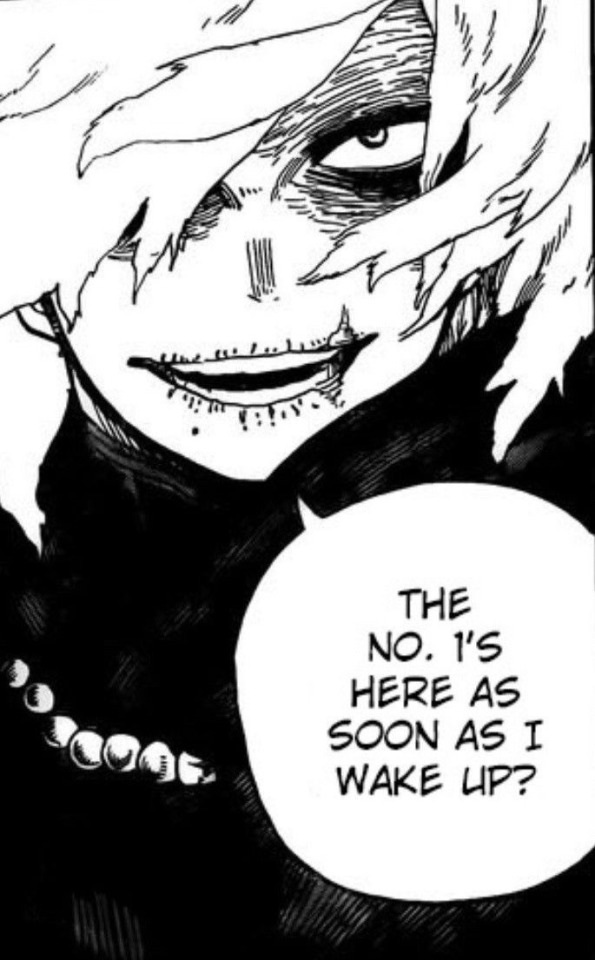
Playing and keeping up with the latest games to distract himself from wallowing in self deprecation and his hatred for heroism,, he still hates hero society with a passion and we all know why but geez, he just wants a break from it all by playing games. Plus he pretends that he’s fighting against heroes in the game and eventually defeats the ultimate boss (whom he pretends is All Might)
Definitely stays up late, browsing through the Internet Gosh, he definitely uses Reddit and gets on a page dedicated to pinpointing the flaws of heroes in society and reads through them. Though he won’t admit it, it gives him a certain sense of relief and reassurance that there are people in society who recognises the flaws of heroism and sees his way. Plus he just prefers reddit more because of how explicit and honest people are, what? He doesn’t sugarcoat his hatred towards heroism so he definitely doesn’t want other people to do it
The first time he reads the other redditor’s opinions on the flaws of heroism, he becomes intrigued but that intrigue turns to anger as he relates it back to his childhood days. It’s been years yet nothing has changed? Society is doomed after all and it reminds him of his destined purpose here on Earth
Sometimes when he’s feelin’ like it, he lounges at the bar all by himself (plus points if none of the other league members are there,, he prefers solitude during these moments) nursing a drink made by Kurogiri and either contemplated on his next plan or just stay there and immerse himself in the peaceful silence. There wasn’t his abusive father who crushed his hopes and dreams, his mother who cared for him yet couldn’t stop his father from his abusive tendencies, his sister who lied even while filling him with hope, his grandparents who loved him dearly but not enough to change the way things were.
Sometimes he finds it pretty ironic that he, someone who originally had the aspiration and dream to become a hero, had been shunned, turned away, abandoned, unloved and was created to be the villain AFO imagined him to be. He wasn’t a villain Born into pure villainy, he was raised to it and that makes him all the more bitter.
He stones a lot, a bit too much but before meeting the rest of the league members, he’s pretty much lonely all the time (asides from having Kurogiri tend to his needs), AFO rarely came to check up on him as he used to back when he was younger (where was he now?). As cynical and untrusting Shiggy is, he longed to still have a human connection, someone he could turn to and relate to his problems and aspirations to wreck hero society. He wanted to reimburse AFO, the figure who had practically raised him and made him who he was today, and show him that he can make the league that he dreamt of, where they’d crush hero society together
Though Shigaraki is aware that he used to be from an abusive and unloving household, he doesn’t want to mull over it for too Long despite how often he does it,, he thinks about it and moves on pretty quickly. Sure he’s got sessions where he just thinks and thinks and thinks about it but as quickly as he is to relate to his childhood, he’s also rather quick to just brush it aside and move on with other tasks
I’m definitely sure the guy’s soft, he just doesn’t outwardly express or show his soft side. He definitely cares! Just that when he’s got the task of bringing hero society down into shackles, it’s not so often he’s got moments to be soft, okay? Besides, other than AFO the man who practically raised him and gave him a purpose, who could he be soft too? Kurogiri was just someone he respected, but he didn’t feel necessarily indebted to him either
Some nights he’d have night terrors of his abusive household, recollections of how hero society has failed to save a child who only needed one, just one person to help him.
On other nights, he’d have dreams of taking over hero society and emerging as the next ruler of the world. He wakes up from the dream in a daze and just thinks to himself
‘Yeah, maybe. This could work,’ he smiles to himself despite all the past events that have culminated to this very moment and moves on with his purpose in life

#boku no hero au#boku no hero headcanons#boku no hero imagines#dabi x reader#league of villains x reader#overhaul bnha#overhaul headcannons#overhaul x reader#bnha shigaraki#shigaraki tomura#shigaraki x reader angst#shigaraki x reader fluff#shigaraki tomura x reader#shigaraki headcanons#mha tomura#shigaraki x reader lemon#bnha dabi#dabi imagine#yandere dabi x reader#dabi x reader#chisaki kai#tenko shimura#boku no hero fanfic#shiggy#yandere shigaraki x reader#alpha dabi x omega reader#dabi headcannons#my hero academia
334 notes
·
View notes
Text

Matthias Schoenaerts full interview for De Morgen Magazine (original in Flemish, translated into English by @matthiasschoenaertsdaily)
Interview by Els Maes, published on November 28, 2020
Even a global pandemic will not destroy the optimism of actor Matthias Schoenaerts (42). Because he knows from his own experience how much beauty can emerge from the most hopeless situations. "I've had my back against the wall often enough, I'll always find a way out."
A bleak autumn day on a concrete square. There is lukewarm coffee, lukewarm Chimay and rolling tobacco. At dusk we see the silhouettes of fat rats that shoot past our ankles. And yet Matthias Schoenaerts will tell us in a glowing argument that this, here and now, is the very best place to be. That there is so much beauty to discover, he says. Le paradis c'est ici. As long as we want to see it.
"It's strange to say in this unpleasant period, but I've enjoyed the past few months enormously. It's the first time in ten years, since Runskop actually, that I'll be home for a long period of time. This is so beneficial: I am photographing, painting, writing. I can devote time and attention to the very simple things we'd otherwise race past."
"Seriously, look at that," he says, picking a leaf off the ground. "Those colors, that pattern. I can spend hours looking at the pure beauty of the things that surround us."
Above us a pigeon is wreaking havoc between the thinned out foliage. "While you are singing about the wonderful beauty of nature, that animal is going to shit on our heads," I say. "And that too will be a s-p-l-e-n-d-i-d moment," Schoenaerts answers.
Matthias Schoenaerts is Belgium's most successful international film star. But here and now, on a bench in his hometown, he is a technically unemployed actor, an all-round searching artist, but above all: fighter of cynicism. "I refuse to go along with all negativity and fear. The true battle today is cynicism versus courage. And I always choose the latter."
We're on the Oudevaartplaats, the square that everyone knows as the Antwerp Bird Market, and where Schoenaerts' childhood memories are waiting to be picked up. It comes into the conversation just like that: Brando, the cute chow chow that little Matthias got from his mom on this square, when here on the bird market puppies were still sold. "My dogs were my great loves. The home situation was often difficult, and with my dogs I found security. We had three chow chows, those fluffy lion dogs with a blue tongue. Brando was the first, I loved that animal."
"We lived in a small apartment with three dogs, anything but ideal. One day we let them go, to people with a large estate. That was heartbreaking."
There is a beautiful lesson in that, about love and letting go. It would have been selfish to keep your dogs if you could give them a nicer life elsewhere, wouldn't it?
"Absolutely, but I obviously didn't process that departure properly. Brando still appears in my dreams, after all these years. Then he returns home unexpectedly, and am I mad with joy.
"I often dream about my parents too: that reunion is so intensely beautiful and warm. Oh, there you are, finally! Those dreams are true to life, and the awakening is rock-hard."
Is that one of the reasons why you like being here in Antwerp, because here you feel more connected to the people that you loved?
"This is my home, my zero, I can't imagine a place in the world where I would rather live. When my mom was alive, and especially when she got sick, in between filming I tried to be with her as much as possible here in Antwerp. In the meantime I have an apartment here, my first permanent place of my own, but I've hardly been there in recent years. Now I can finally enjoy my home, I find peace, tranquility and inspiration there. I have seen fantastic sunsets on my roof terrace in recent months. So much beauty, and you can just admire it there, every day, for free. As long as you take the time to enjoy it.
"Normally I would have started filming again in April, and left for a hectic ride of at least two years, with projects that would follow each other quickly. I was at my limits, sooner or later I was going to bang my head against the wall. I feel how beneficial it is to slow down for a moment. David Lynch said that: 'Just slow things down and it becomes more beautiful'.
"As an actor you have to work in a big machine, according to a tight schedule. I have now discovered the pleasure of creating things for myself very spontaneously in my own cadence."
Is that work something you ever want to go public with?
"I want to do something with my photography someday, but I'm in no hurry. I'm also writing a film script, I've had an idea for a trilogy for a long time. It's a very personal project, and it takes time for it to crystallize into something very pure and proper. Maybe those films will come within ten years, maybe never.
"The most important thing is to keep busy. You have to look for something, anything, on which you can focus your passion, love and attention. Of course I would like to return to set, and those projects will come back later. But if I can't change anything about a situation, why worry about it?
"From a very young age I learned that there are not many certainties in life, I adapt easily to unexpected circumstances. There is one thing I can't stand, and that is feeling powerless. I never want to be the victim of a situation, I will always think: what can I do myself? Which way can I go? I have often enough stood with my back against the wall, I will always find a way out and take matters into my own hands."
So Schoenaerts decided to use this period to put Zenith - his artist name as a street artist - to hard work. Since the lockdown he has already created nine impressive murals, including one in the courtyard of the Oudenaarde prison, and one at the beginning of this month in the Antwerp Begijnenstraat, on the bare walls that form their furthest horizon for the prisoners. A moving event, he says. Not only by the touching conversations with inmates, and the forty-minute applause with which the prisoners welcomed him. "The mural contains a poem by my father. While I am there painting those beautiful words of my dad on the wall, I suddenly remember that my mom used to give meditation lessons to the prisoners there in the Begijnenstraat. I had completely forgotten about that until I stood there. How beautiful that is. Suddenly I felt my parents very tangible, very close to me."
It's a bit funny: a long time ago you were arrested for graffiti, now they invite you to prison to make a mural.
"I used to tag a lot, but I really don't like the vandalism that sometimes comes with graffiti. Defacing a facade, that's just ridiculous. But trains, bridges, tunnels.... frankly I think that's the max. Soon I'm going to do another oldskool graffiti wall, with some friends, back to the roots. But with permission, yes."
Scary dudes
The problems of the Belgian detention system are well known: outdated infrastructure, overcrowding and a system of pre-trial detention which means that some people are innocently stuck for years. Schoenaerts: "These are human lives that are destroyed by the Belgian state, isn't that scandalous?"
Schoenaerts' engagement started years ago, after meeting Hans Claus, prison director in Oudenaarde, who contacted him when he wanted to organize a screening of Le Fidèle, the film by Michaël R. Roskam starring Schoenaerts. Claus has been fighting for many years for a reform of our detention system, among others with the non-profit organization De Huizen, small-scale centers that are more focused on rehabilitation and reintegration of the detainee. How does Schoenaerts see his role? "Those murals are a kind of lubricant for me, to get attention for this problem. I am not the expert and I am certainly not a politician. This injustice touches me as a human being, and my message is clear: please listen to the people who have been working hard for decades to reform the system from the inside."
In The Mustang, your last feature film to be seen here before the lockdown, you take on the role of a prisoner who learns to tame wild horses and his demons. Has that role changed your vision?
"That rehabilitation program with mustangs really exists, and the chance of recidivism is almost zero percent. I had a conversation in the Begijnenstraat with the minister of Justice Vincent Van Quickenborne (Open Vld, ed.), and he told me that the chance of relapse here is 40 to 50 percent. Isn't that madness?
"That's what fascinates me most of all: what do we do with those detainees while they're stuck? How can we help to break the destructive patterns that put them in prison? Imprisonment is a punishment in itself, but someday we'll send those people back into society, so let's mainly support them in their self-development.
"In preparation for The Mustang, I visited prisons in the U.S., and talked to men who had been detained for 20, 30 years. Heavy guys: Aryan Brotherhood (powerful crime syndicate of neo-Nazis in American prisons, ed.), Mexican gang leaders... real scary dudes. You know what those say to me? That they live in fear every day, but they must not show weakness. Psychological counseling and things like that have their value, but that's often very cerebral. I especially believe in the healing power of art. Imagine that inmates can express all those fucked up emotions through art: I think that there is an enormous potential in this."
I heard you're playing with the idea of giving acting lessons to inmates?
"That's not a concrete plan yet, but I would love it if people from the creative sector would commit themselves to this: musicians, sculptors, dancers. Or writers who help prisoners put their own story into words.
"The cultural sector needs to start sticking its neck out. The sector is lying flat, and that's terrible. But we have to keep moving. We can all do something for the community, without being paid for it. Planting small seeds, doing something good for your fellow man, something beautiful always comes out of it."
Had you been to a prison before The Mustang?
"To visit friends, yes. In Merksplas, Hoogstraten, Hasselt, Dendermonde... We shouldn't talk about that any further. A prison is deep tristesse. Who dares to call that 'a hotel', shame on you."
This summer you painted an impressive mural in Paris in honor of George Floyd, murdered by American officers. And in Ostend last week a new mural was unveiled, with a 'decapitated' Leopold II. Is activism an important part of your street art?
"Graffiti used to be more of a style exercise for me, you want to create things that get noticed within the scene. But gradually I felt like communicating with a wider audience. I like to incorporate a lot of symbolism in my paintings, such as the cracks I photograph all over the world and then magnify them in another place. And the praying hands, a universal image of hope and faith in yourself. Art has the power to speak to our deepest emotions, and that is what binds us to the other. Connectedness, empathy, harmony, solidarity, that's the essence for me."
The corona crisis is one big exercise in empathy and solidarity. Sometimes we seem to lack that.
"I refuse to surrender to cynicism, and I surround myself with positive people who do beautiful things for others. This period would lead us to insights: how do we deal with each other? Do we help each other, or is it every man for himself? A human is such a wonderful creature, but we mess it up so much for ourselves.
"Yeah, I know. Some people who read this will think: this guy is smoking too many joints. (laughs) I don't smoke joints, and I'm not an unworldly idealist. But I will always focus my attention on the good, in spite of everything."
If you always want to see the good in people, are you sometimes disappointed?
"Yes, of course. I'm not a naive brat, I've learned to guard my boundaries. I can't please everyone all the time, and I don't let anyone rush me. I react badly when people put pressure on me because they want things from me. The perception of me that others have of me, I can't control. I don't let myself put out of balance easily anymore."
I saw that on your Instagram Stories you warned about fake profiles on social media, of people pretending to be you. That made you visibly angry.
"Really, that makes me angry. Every day I receive screenshots from people who have been tricked by crooks who approach innocent victims with my name and my pictures. There are stories of fans who have paid thousands of euros because they were promised a meet-and-greet with me. How disgusting is that? One person has transferred 14,000 euros to someone who pretended to be my manager.
"Of course, that raises questions about how gullible some people can be. But I've seen those chat conversations for myself: those criminals are terribly sneaky. They know how to play on the vulnerabilities of their victims in a very cunning way. This is manipulation and swindle of the filthiest kind.
"Really, I get physically unwell when I think about it. How can someone be so mean? If I ever catch these guys, I'm gonna bash their skulls in, I'm not kidding. Sorry."
Or: those crooks get a jail sentence, where you're going to give them acting lessons.
(laughs) "Okay, let it be clear that I think everyone should be punished for their crimes. My commitment to the prison system is not a plea for impunity, and I certainly don't want to romanticize crime.
"But when someone abuses innocent people's trust in such a cunning way, the question is: how did you derail so morally? And above all: how can we initiate a transformation in that person? Surely you can't lock someone up and expect that person to suddenly make better choices years later? First such a person has to take responsibility for his own actions."
Do you have something criminal on your conscience?
"No." (Thinks for a second) "No. Thank God. I couldn't live with that.
"I've probably hurt people in my life, like everybody else. Sometimes we just hurt people because of who we are, or because we can't fulfill what others want from us. But I have never harmed anyone consciously or criminally, no."
As a teenager you sometimes came into contact with the juvenile court, for vandalism. Do you think you could have ended up on the other side of the bars?
"Probably, a life can take strange turns sometimes."
What made you sit here today, and not get on the 'wrong' path?
"Wait... that's a good question. There's the one terrible dramatic event that caused a total turnaround in my life: when my dad went into a coma after a psychosis, and I was told he only had 24 hours left to live.
"I was 21 then, thrown out of school for the umpteenth time. I was doing graffiti and wanted to find my way creatively. But I was messing around, going with friends who... Anyway, there was latent danger, it threatened to go a little bit the wrong way.
"And then I got that phone call: come and say goodbye. Bam. The relationship with my father had been sour for years, we hardly saw each other. Until I stood there at his deathbed in intensive care... I only felt love, a wave of emotions that I had pushed down very deeply. That realization was rock-hard: this was it. My father and I will never get the chance to figure shit out, I thought.
"Long story, the rest is known: after 72 hours my father woke up from a coma against all odds. Like a plant: he could not speak, reacted to nothing or nobody. According to the chief psychiatrist, we had to accept that his condition would never improve. That was without the fighting spirit of my mother and me.
"It's because of that unlikely event that I've changed my whole lifestyle. For eight months, my mother and I went to visit my father every day. We talked to him, but he seemed to look straight through us. For hours we sat with him at the psychiatry department of Stuivenberg, how desperate those first months were also. We continued to fight, taught him to talk, to eat, to walk. A miracle, the doctors called it. Bullshit of course. It was love, dedication and stubbornness. Especially thanks to my mother, the lioness who kept fighting for him. And see how much beauty came out of it. My life then received an entirely different impulse.
"I suddenly think of an anecdote I've never told before. After a while we were allowed to take my father to the cafeteria once in a while, or to the garden. But he was absolutely not allowed to leave the hospital. Fuck it. I hid a bag of clothes for him, secretly dressed him in the toilet and took my father to the city. By bus, because I didn't have a driver's license. I wanted to stimulate his senses, test if any memories would come back. He was fond of Our Lady's Cathedral, so that's where I wanted to take him."
Matthiaske, why am I crying?
He plays it out. The written version here is only a dead script compared to the lived-through performance, right there on that dark square, just around the corner of the Arenbergschouwburg, where Matthias made his stage debut as a 9-year-old boy next to father Julien, as The Little Prince.
Matthias shows how he supported his frail dad, and how they shuffled in small, careful steps towards the cathedral. Dad looking at the ground to be sure not to fall. "I say, 'Dad, look up'. He looks up, and I see the tears rolling down his cheeks. I had never seen my father cry. 'Matthiaske,' he says, 'can you tell me why I'm crying?'
"I had already decided then that I would take my father into my house. Overconfident, yes, at that age, but they have become the most beautiful years of my life. Mom came by every day to help. Suddenly we were a bit of a family again, something we had only been for a short time when I was young."
It was at that time that you decided to become an actor. Why did you decide to become an actor?
"I had always resisted following in my father's footsteps. In my youth I mainly wanted to break away from my father, and seek my own path. I didn't want to have anything to do with him and all those loudmouths around him in the theater world. But most of all I was terrified that compared to the great Julien Schoenaerts I would never be good enough.
"Only now do I understand why I then decided to go to the conservatory. Not to become an actor, but to understand my father. We had so many years together, and now that we had been given a second chance, I wanted to get to know him as well as possible. By acting, maybe I could get closer to him." (pauses)
Sentimental fuss
He banishes the tears. It's one of the many things he has in common with his father, he says: they're both very emotional, but they hate sentimental fuss. "Come on, Matthias: breathe," he commands himself.
"Voilà, see how much beauty can come out of misery. What a chain of beautiful things came out of the fight my mother and I put up in the most hopeless situation. Who knows how differently my life would have turned out?"
"There are so many lessons in that. If we just talked about the rehabilitation of detainees, for example. It takes commitment. Not a workshop of two hours. You have to persevere, even in the event of a setback, with no guarantee of a happy ending. That's why I think it's so important to keep telling that story about my dad. Those are the values I believe in: dedication, stamina, attention, love. You can apply that to everything in life. Love is the fuel."
You often talk about your parents as if you want to keep them alive with your words.
"Because my mom and dad are the people I've loved most. With them I shared the most important moments, built the most beautiful memories. That loss is enormous. Life has been really fucking tough since they've been gone.
"That's what grabs me so much in this period. How many people have died of corona in Belgium?"
According to Google, today, on the day of the interview, the counter stands at almost 14,000 deaths.
"Fourteen thousand! Imagine how many people that has an impact on? How many people have suddenly lost their mother, father, brother, sister, best friend or neighbor? Behind those figures lie tens of thousands of poignant stories, of people who see a loved one torn from their lives. That is a mountain of unresolved grief, and far too little attention is paid to it."
Earlier during our conversation a guy had walked past coughing and maskless. It pissed Schoenaerts off: "And whining about masks or strict measures. Grow some fucking balls. Having to say goodbye to a loved one, that's the worst thing."
"Isn't that what this period teaches us? That our time here is limited? And what really counts in life: sharing moments of beauty with the people you hold most dear. All the rest is wallpaper. Having success, making movies, that's all fun. But the day you lie on your deathbed, you really don't think about the professional successes on your resume. No way."
83 notes
·
View notes
Text
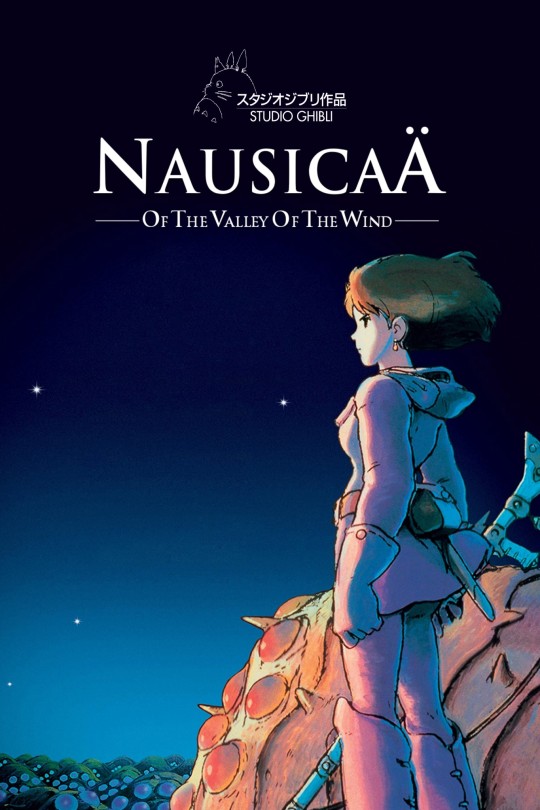
Nausicaa and the Valley of the Wind (1984)
Prayers and Salutations Cult Members! I am your mysterious minister Reverend Chainsaw and this is another nights revival service at the Cult Film Tent Revival. I bring you a special word tonight. Tonight's word is about a person who roamed the earth, in a time where people were backward and warlike. A leader emerged into a kingdom full of eschatological expectation. This leader came preaching peace, and was killed for the sins of the world, but was resurrected. In that resurrection a new hope was brought to the planet, and true healing through the power of love in the face of violence is made possible. I am talking of course about Princess Nausicaa from the Valley of the Wind.
The Message
Nausicaa and the Valley of the Wind is the film that put studio Ghibli and Hayoa Miyazaki on the map. No animated feature this grandiose and epic had been achieved by 1984, as much as Disney may beg to differ. The tale may be simple, and it may feel super 80s to us today, but Nausicaa is a masterpiece, and the fact that Howl's Moving Castle is brought up alongside Princess Mononoke and Spirited Away more often than Nausicaa is a farce and a tragedy.
The film takes place on a fantastic planet that seems to have suffered the ravages of an apocalyptic war. A war that involved gigantic warriors with powers so devastating they about made the entire planet inhospitable if not uninhabitable; save for a few areas. The fall out of this ancient war has left the earth in a state of repair, where the natural processes of a planet healing has creating giant toxic jungles.
Beyond these jungles lie two imperialistic factions, they seem almost to be city-states but it's not terribly clear. The Kingdom of Tolmekia, a militaristic proto-fascist society of almost Spartan sensibilities. Tolmekia is governed by the ambitious and cynical Princess Kushana, But I like to call her Furiosa. Just like Furiosa, Kushana is physically missing parts of herself, a visual metaphor for her metaphysical lacking and the parts of her humanity she has cut away. Kushana's world view is one of fear, a fear that can only be quelled by waging a genocidal campaign against her enemies.
Speaking of enemies, the Athens to Tolmekias Sparta would be the Pejite Kingdom. The Pejites might like to view themselves as simply responding to Tolmekian aggression, but the narrative of the film, and the story told quite visibly on the body of Kushana, is quite different. The Pejites are just as bloodthirsty if not more palettable in their approach, but like the Tolmekians, they believe only their own lives have any value. And thus, in this theatre of war, a Giant Warrior from the ages before is unearthed by the Pejite Kingdom, Stolen by the Tolmekians, before the forces of nature themselves, seem to conspire to drop the Giant Warriors "egg" right into the Valley of the Wind.
The Valley of the Wind is populated like the world of Avatar the Last Airbender, that is mostly of children and the elderly. The people of the Valley have been able to remain untouched by the ravages of war and the toxic jungles of the damaged world primarily due to geographic luck that's explained in minor exposition in the film. They are ruled by a King, and they are all deeply enamored by their beloved Princess Nausicaa.
Nausicaa is a gentle soul. She is kind to animals, she is empathetic, unreasonably patient, and bears pain and grief inflicted on her out of cruelty with a saintly understanding. She really is a thinly veiled Christ figure, scratch that. There is no veil. But she's also my favorite Christ figure. She does not preach a message, as much as she tries to save everyone from their own short sighted goals. She is not perfect, she does lash out and do some fantasy sword fight murder, but she regrets her actions so deeply that it seems to have played a part in motivating her to become even more compassionate and patient with the evils of the world.
Nausicaa discovers yet another plot by the Pejites, who are afraid of the possibility of the Tolmekians awakening the Giant Warrior, to use animal cruelty to enrage a group of almost invincible giant insects known as the Ohm. By luring the Ohm into the Valley of the Wind where the Tolmekians have become an occupying force, they hope to completely wipe out everything that threatens them. The Tolmekians DO awaken the Giant Warrior and pure pandemonium ensues. Nausicaa manages to save the Baby Ohm and calm the rage of the bloodthirsty Ohm swarm, and to defeat the warlike tendencies of both the Pejites and the Tolmekians. All the while fulfilling a prophecy fortold about a messianic savior figure called the Man in Blue.
Now that you have heard the Gospel of Nausicaa, please stand to receive The Benediction.
Best Character: Half a Person
Now that I've spent the better part of this review gushing about our Lord and savior Nausicaa. I have to admit, she's at times a bit too perfect, a bit too saccharin. Even her flaw, or her one weakness and her failing to be perfect, just adds to the perfection. I can't even say she never makes mistakes cuz she made one, and that's infuriating. It's even more infuriating that I still think she's a great character. Normally this kind of thing really kills a hero. Most Chosen Ones are the most boring and least likeable characters in their narratives. I don't know how Nausicaa avoids this trap, but she does. I'll have to do some meditating on that.
However, just like in your typical Chosen One fantasy narrative, the hero is a lot less fun than the villain. I'm going to say the best character in Nausicaa is Kushana. I want to be like Nausicaa, but I don't understand her. She's almost alien, even though we learn all about her. Kushana is mysterious, secretive, and enigmatic, yet I understand her. She barely has an arc, she doesn't really change. She's cold and cynical to the bone, but I don't need to see much of her situation to completely understand why she is the way she is. I usually hate totalitarian bad guys, but Kushana I like. Sue Me.
Also fun fact, did you that Nausicaa means 'Sinker of Ships'. That's kinda fun.
Best Scene: Spoiled for Choice
I'm going to be lazy and say take your pick. There is really not a bad seen in this movie. If the action isn't going, then there's intriguing dialogue. If there's no dialogue then you may be about to get hit with a forceful burst of whimsy. There's horror, there's swordfights and aerial dogfights. The only thing in Nausicaa I don't like to see, is the bloody tortured Ohm Baby. It's like a god damned Sarah Mclachlan commercial.
Best Creature: Foxy Shazam!
The Ohm are so simplistic yet so detailed. The number of eyes is alien, but the way they are used is expertly expressive. Who'd think you could get me to love what basically amounts to a silverfish with the intensity that I love a kitten. How did Miyazaki pull an Okja with a creature that should be haunting our dreams? I don't know.
And what about the Giant Warrior! If you are an Evangelion fan then you probably already know that Hideaki Anno designed and animated the melting goopy biomechanical beast. Surely a sight that would make both H.R. Giger and Clive Barker giddy with excitement. Just the image of the silhouettes marching amidst the desolation of the old world is burned into my brain.
So which of these is the best creature from Ghibli's first outing? It's fucking Teto. It was always gonna be Teto you idiot. Just look at Teto, he's adorable. He's too cute to exist. I'm so alone. I need a pet.
Best Character Design: Tolmekian Regalia
I originally included this category to talk some about Kushana, however, at that time I also thought I was going to say Nausicaa was the best character. I thought hard about deleting it, but I think it's a different category and you can't accuse me of playing favorites because my favorite character is clearly Teto. Just to keep it simple. It's the two costume shift from full military regalia in white and gold, to the one metal arm, warrior princess get up. It's a great costume and a great look. Get on this shit cosplay nerds. It's great for Cons in Canada, you have to think about layers, and you can't keep going as Mr. Plow. It's lazy.
Best Excuse to Talk About Patrick Stewart's Character: Lord Yupa
I just realized that I was about to write this whole review without talking about Lord Yupa. Lord Yupa is a sword saint and all around badass I think a lot of entertainment, especially in the west is lacking bad ass old men. Lord Yupa particularly shines in the early half of the film as a warrior and as a wise council to Nausicaa. If she's Jesus then Yupa is John the Baptist. He is also voiced by the elegant and eloquent Patrick Stewart. He also comes with 2 chocobos!
Worst Character: For Whom Asbel Tolls
This might also be the worst actor category as well. Actual Cannibal (haha meme) and actual monster (haha real life) Shia Labeouf doesn't so much act in the role as he read the lines and it was recorded. The good news it doesn't effect the film too much because Asbel is completely forgettable. He is a catalyst to some of the action, but besides that I don't really care for him.
Worst Aspect: To Be Fair ...
It would be unfair to completely ignore anything negative about Nausicaa. I have already mentioned in many places that there are some pretty corny, or pretty predictable tropes to this movie. But what I can't capture in words is exactly why it feels fresh when it's done in this movie. I suppose that's what makes it good. It's just so good that it's weak points are lifted up by it's strengths. Some people may bored of Nausicaa's unyielding goodness, or that she very rarely chooses to take action as much as she chases and pleads with her surroundings, but I mean, she does pay for that eventually. It's a fantasy story and it hits a lot of timeless themes that have been hit in stories for as long as human beings have been telling stories. Some people may feel that it doesn't do enough to stand out.
Summary
I have defined the S tier for myself as "near perfect and personal favorite" films. I like to think that Nausicaa and the Valley of the Wind is near perfect. Some may say that it looks like it might just be a personal favorite. In the case of Nausicaa, I'm having a very hard time telling the difference. I think it would be overly simple to claim that Nausicaa is just an ancient archetypal heroes journey with an 80s anime coat of paint. I think it's doing quite a few new and interesting things with that formula, those things are just playing out all around that narrative as opposed to being at it's center. For a first full length outing by the studio, you can really see Miyazaki's heart and the values he holds close to. I'll repeat myself so that we are completely clear on the matter. I think Nausicaa and the Valley of the Wind is a near perfect movie.
Overall Grade: S
#Nausicaa#Nausicaa and the Valley of the Wind#SciFi#retro scifi#Fantasy#post apocalyptic#hayao miyazaki#miyazaki#studio ghibli#ghibli#S#Grade S#Grade: S#1980s#1984#anime#animation#japan#japanese#(S)
9 notes
·
View notes
Text
Mirror & Misdirection - The Distortions of the Mirror Scene
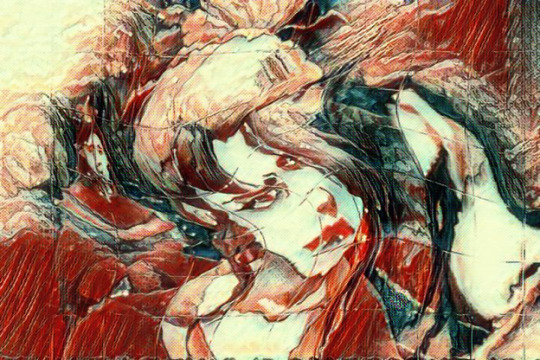
How excessive, myopic emphasis on the Mirror Scene distorted both the fandoms and Brykes’ understanding of Azula, and what the Finale actually says about Avatar’s most controversial villain.
Executive Summary
To understand any fictional character, you have to understand their Goals, Motivations and Conflicts. This applies to Princess Azula from Avatar: The Last Airbender.
Ever since Azula was humanized in the Finale, arguments have raged over whether or not she has the capacity for meaningful growth and change like any other character, or any other human being.
At the core of these arguments has been the infamous Mirror Scene where, while talking to an hallucination of her mother, Azula expresses doubt, regret and tear-stricken grief. As a thoroughly established villain who had never before shown such feelings, this scene was taken as character-defining.
However, the Mirror Scene alone does not reveal all of Azula’s Goals, Motivations, and Conflicts. Instead, the Mirror Scene, when taken by itself, is only a Conflict. As a result, the Mirror Scene has distorted both the fandoms and Brykes’ perception of Azula by assuming she is entirely the work of complex, vague and puzzling psychological phenomena surrounding her mother, versus a variety of well-defined Goals and Motivations.
In actuality, the Finale gives us two other scenes that, combined with the Mirror Scene, give us everything we need to understand Azula’s Goals, Motivations and Conflicts.
In this article, I will provide an alternative explanation of Azula’s character that relates directly to the source material and which does not rely on psychological theory.
First, I will summarize the “Azula Debate” to provide proper context for this subject.
Next, I will explain the character-building concepts of Goal, Motivation and Conflict and why they are especially critical to devising a workable understanding of Azula.
After that, I will explain how the Finale yields Azula’s Goals, Motivations, and Conflicts, and I will provide an alternative explanation of the Mirror Scene as it relates to them.
I will then explain why the fandom incorrectly fixated on the Mirror Scene and how this distorted both the fandoms and Brykes’ understanding of their most controversial villain.
And finally, using these Finale-revealed Goals, Motivations and Conflicts, I will suggest a “path forward” for Azula’s further involvement in the Franchise.
The “Azula Debate”
When the Finale aired in 2008, one of the most striking and controversial developments was the rapid humanization of Azula. For the first time, we saw the fearsome and always-winning Princess scared, paranoid, emotionally fragile and crying. It was a radical shift from our previous image of Avatar’s most hated villain. Nothing like it had yet happened in the Franchise.
The topic of Azula’s newly-revealed humanity was so compelling that even Mike and Bryan were asked about it in the Sozin’s Comet novelization. While their answers were vague and disjointed, the fact they had an affirmative answer shows that Azula’s humanity wasn’t an accident; it was intended.
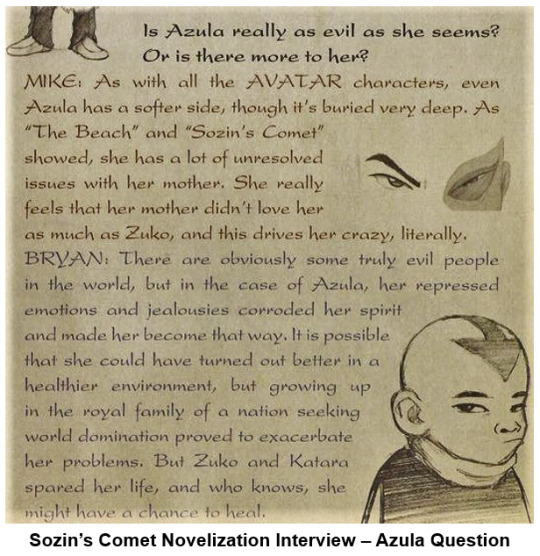
And the fans saw this: they saw an Azula that was more complex than what they had been previously shown, or lead to believe existed.
While Azula’s breakdown in the finale was well-animated, scored and voice acted, and the show wrapped up nicely overall, the Finale created more questions than answers for the Fire Princess, most of which still have not been answered to this day.
What is Ursa and Azula’s relationship? What is Azula’s moral compass? What does she value? What is the extent of her empathy? What lines will she not cross? Why does she use fear to control people? Does she enjoy hurting people? Can she feel love? What does she want in life? Why did she throw bread at turtle ducks? Is she a sociopath? Will she reconcile with Ursa? Is she mentally ill? Will she ever rise from the ashes of her shame and humiliation? What happens to her next?
These were the sorts of questions fans were asking in the aftermath of the Finale, and which fans are still asking.
Unfortunately, the fandom did not approach this topic with unity.
What began after the Finale was an endless back and forth about morality and affective empathy; psychology and personality disorders; juvenile delinquency and abuse dynamics; Dracos in Leather Pants and Freudian Excuses, with one side arguing that there wasn’t anything inside Azula worth exploring, while the other side desperately clung to the hope that there was potential for compelling growth in Azula. You could term the “anti” side the “Azula Haters” and the “pro” side the “Azula Fans”.
The “Azula Fans” are a diverse group that cannot be generalized. In summary, they found Azula compelling for a variety of reasons, they had questions they wanted answered and they desired to see Azula fleshed out fully.
The “Azula Haters” are equally a diverse group and so cannot be generalized. Overall, their motivations are primarily to relate Azula to real-world bullies and abusers, thereby preserving her as a platform to talk about escaping domestic abuse situations and how to give up on toxic family members. Relating Azula to the real-world in this way is not to develop the world of Avatar and its characters, but to express their own anger, cynicism and heartache over what’s occurred in their own and other’s lives, and teach lessons about it.
The key point is this: the purpose of the Azula Debate was not to discover the truth about Azula and determine how to tell a story about her. It was to either admonish “Azula Fans” for being misguided and ignorant in their understanding of Azula, or to prevent the “Haters” from discouraging their last, major interest in Avatar.
In the twelve years that have followed since the Finale, neither side has “prevailed”.
Aaron Ehasz has spoken about the potential for a Post-Finale Azula arc whereas Mike and Bryan have said little, or nothing. Wheras the fandom can all agree about their love for the heroes, Azula is like talking politics at a family gathering; it will not be pretty and passions will be inflamed.
While Azula was brought back in The Search and Smoke and Shadow comics, these works yielded few, if any, answers to her developments in the Finale, and she remains a divisive character. In fact, much of her complexities established in the Finale were ignored in The Search and erased entirely in Smoke and Shadow.
It can be argued that the Azula from the show did not actually make it into the comics and still remains “in an asylum off the coast”, waiting to be further developed. As a result, both Azula Fans and Haters argue to this day with no end in sight.
Driving these debates is the fact that nobody, not even the Creators, have provided a comprehensive, question-answering, Franchise-consistent explanation for Azula that combines her wickedness with her humanity.
To Haters, Azula is the embodiment of all things awful and terrifying that must be removed from society. To Fans, she is the potential for another compelling character-driven story utilizing the original cast.
A word frequently used to describe these “compelling” additional stories about Azula is “redemption”. This is a vague word with multiple meanings. Typically, both Avatar fans and the Creators interpret this as a character who is morally good on the inside realizing their mistakes and atoning for them; these characters are not truly bad people; as long as we don’t think they have crossed any moral “lines in the sand”, they can be accepted into the circle of “good people”.
This is what has caused debates surrounding Azula to be focused on questions of morality, affective empathy and psychological disorders instead of her Goals, Motivations and Conflicts; if “Haters” can prove that Azula is genetically bad, then there is no potential for a story about her because it is impossible for her to change and grow, and stories require their characters to change and grow. On the other hand, if “Fans” can prove she is “human”, then she does have the capacity to change and grow, and the themes of the Franchise can be applied to her.
Unfortunately for Azula Fans, there are two seasons of wickedness, smirking and bedeviling Zuko to back up the Haters’ position.
But Azula Haters also have to contend with the Finale. It demonstrated the existence of Azula’s humanity and was an intentional decision by the Creators; Fans are not “reading into” it. Even Katara felt Azula’s humanity.
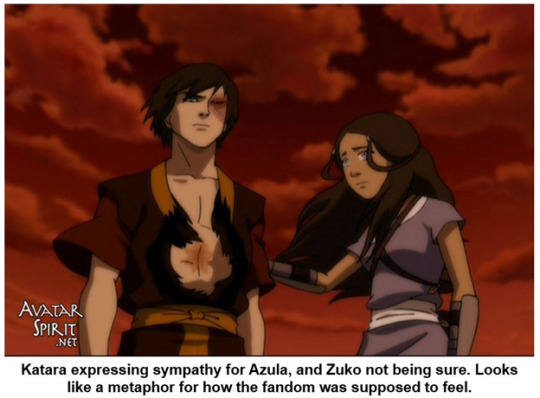
So who is correct?
Well, the Haters are, for the most part.
The show spent a lot of time portraying Azula as unnecessarily cruel without a shred of self-doubt, suggesting her villainy is not just a matter of her upbringing and choices, but intractable psychological defects. Even the Creators wanted Azula to reflect a “deeply rooted malevolence.” To counter this, Azula Fans point to the Finale, and more specifically, to the infamous Mirror Scene.
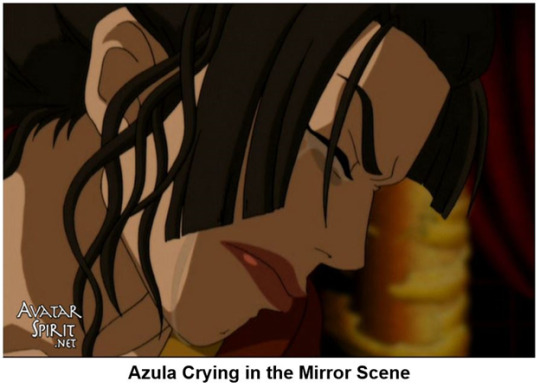
The Mirror Scene shows Azula expressing doubt, remorse, hurt and even tear-stricken grief. The Mirror Scene has been used by Azula Fans to explain all of Azula’s humanity, sort of as a Rosetta Stone of her innerworkings. Even the Creators seem to think this way, as shown by their answers to the Sozin’s Comet interview, and their choice to make Azula’s relationship with her mother in The Search take center stage, and drastically so.
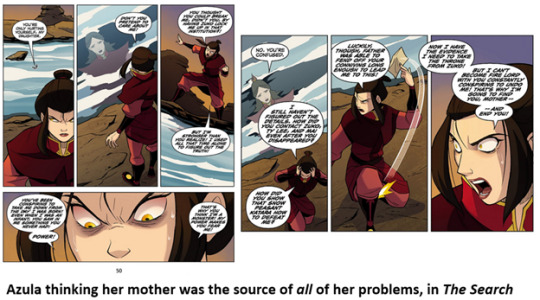
THIS. IS ALL. WRONG.
In order to understand a character, you have to understand their Goals, Motivations, and Conflicts. Any character, especially Azula.
The Mirror Scene and her relationship with her mother are not what’s vital to understanding who Azula is, what she wants and how she fits into the Avatar world. This is not an attempt to be “edgy” or “different” or “contrarian”. You will never, ever find your answers in The Beach or in the Mirror Scene alone, no matter how hard you try. This is because the Mirror Scene is only one of three scenes from the Finale that must be taken together to understand Azula on a fundamental level.
The Mirror Scene is not enough. It has not answered the fandom’s questions about Azula’s Goals, Motivations and Conflicts. It has not provided a compelling argument against the evidence that she is a monster whose villainy was only limited by the censors and, most importantly, the Mirror Scene is not Azula’s most defining moment.
These three, together, are:
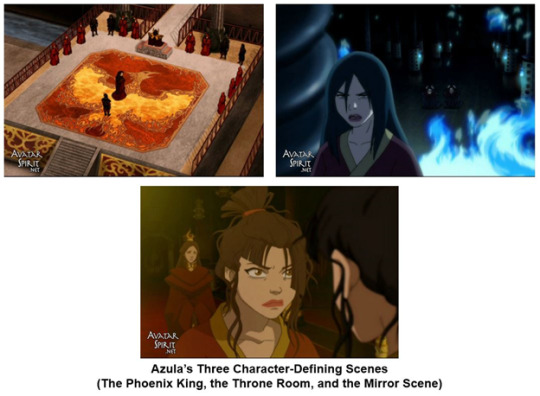
And I will explain why.
Understanding Characters: Goals, Motivations, & Conflicts
This section gets into some of the “nuts and bolts” of storytelling, but it is necessary for understanding Azula; she is too complicated and the source material too thin on her. Stick with this and you should learn something.
In order to understand a character, you have to have a clear understanding of their Goals, Motivations, and Conflicts. Other writers have different terms for these concepts (Need, Want, Desire, Obstacle, etc.), but they are universal to storytelling.
Stories are not meant to be exact replicas of real life. Yes, they can say something about life, but ultimately, stories are about characters having problems to solve and their journeys to solve them. It is not enough for a character to just “feel”. They have to want things, need things, do things, and something has to prevent them from getting what they want and need.
Conflicts are what prevent characters from achieving their goals (their wants and needs). Motivations are what drive characters to pursue their Goals, and Goals are what characters strive to physically achieve.
Goals are physical; they can be touched, held, acquired. They can be a person, a place, or a thing. They are not emotional or psychological. “Love” is not a Goal. Being in the arms of someone or waking up in bed next to them, however, is a goal. Goals are what enable characters to be active in the story, to move through the world, exert force on their surroundings. Sitting on the sofa, or ruminating in a prison cell are not Goals; getting up to join the protest or hatching an escape plan are. At the same time, “wanting power” is not a goal, but “becoming president” is.
For some Avatar examples, “Capture the Avatar” is a Goal. “Master all four elements” is a Goal. “Liberate Ba Sing Se” is a Goal, but “My mother thought I was a monster” is not.
Goals, however, do not exist by themselves. They are the result of Motivations.
Motivations are internal. They are abstract. They cannot be touched or acquired. They derive from the thoughts, feelings, philosophies and psychologies of the characters. Some motivations can be caused by external forces, such as fear of breaking the law, a military commander giving an order to a soldier, or the threat of dying from starvation, but those external forces are not Motivations: fear of imprisonment, commitment to one’s leaders, and the will to survive are because they are emotional, philosophical, psychological.
Motivations are where characters encounter those moral “lines they won’t cross”. It’s where they doubt themselves and wonder if they are willing to go “all the way” to stop the villain. Motivations are what drive a character to question if they should kill the man who murdered their mother, if they should kill the Fire Lord and ignore their culture, or betray their uncle to return home. Without Motivations, characters are robots. With Motivations, characters become people.
But a story where characters face no opposition is not a story. This is were Conflicts arrive.
Conflicts prevent characters from achieving their Goals. They can come from a variety of sources: internal or external; emotional or religious; psychological or philosophical, or combinations thereof. Conflicts can stem from Motivations (for example, somebody violating their moral code), but they are not themselves Motivations. For example, if a character is motivated to carry on the cultural values of their lost people, but their duty requires them to violate that culture, their struggle to reconcile the two is a Conflict. Or, if a character is motivated to be the image of the son his father wants, but finds out that image is completely against everything he stands for, his struggle to remain at his father’s side or leave is a Conflict.
The type of Conflicts that “build character” are the ones that result from Motivations, not merely external forces. A character simply climbing over a fallen tree is not as compelling as a character who must decide if they should cut down the tree when there’s a nest of endangered owls living in it. Characters must decide for themselves. They must struggle with their feelings and values.
However, Goals, Motivations and Conflicts are not the end-all-be-all of character. Characters can have secondary goals and motivations. They can have quirks, flaws and personality traits that give them depth and round them out, but their Goals, Motivations and Conflicts are what creates a story about them. They’re why Zuko being willing to burn down Kyoshi Island does not tell us the full story of Zuko, but it tells us something about him. They’re why Azula hanging Ty Lee over a burning net does not tell us the full story of Azula, but it tells us something about her. And they’re why Aang killing a buzzard wasp in cold-blood does not tell us the story of Aang, but tells us something about what he’s going through and what will make him ignore his values.
In short, we have to know a character’s Goals, Motivations, & Conflicts in order understand them, only then can a character be fully fleshed out in a story that makes them overcome diversity, change and grow.
The Goals, Motivations & Conflicts of Princess Azula
In order to answer the lingering questions about Azula, including how to tell a story about her in the Post-Finale world, you have to understand what she wants, why she wants it and why she is unable to have it. In other words, you have to understand her Goals, Motivations & Conflicts.
As it turns out, the Finale gave us all of this. Now, keep in mind, the Finale doesn’t tell us everything about the Fire Princess, just like how the show doesn’t tell us everything about General Iroh prior to Lu Ten’s death, but the Finale tells us enough in order to develop a workable explanation of her character. This explanation of her character was revealed in three scenes, starting with the one in The Phoenix King where she is speaking to her father on the platform, followed by the scene in Into the Inferno when she is talking to Lo and Li in the throne room, and, finally, the Mirror Scene.
Not everything is explicitly stated and neither does it explain her bullying, teasing, smirking and smugness, but it doesn’t have to. Those are flaws, quirks and other personality traits. These three scenes in the Finale give us the big stuff; the information that’s needed to tie her into the franchise at large and make her a product of the Avatar world versus a mere set of villainous qualities.
And it begins with The Phoenix King.
Pivotal Azula Scene #1: The Phoenix King

I’m sure you can picture it: Azula racing to join her father on the platform, getting told she’s being left behind, frightened because she thought they were going to burn the Earth Kingdom together, snapping at her father for treating her like Zuko, desperately insisting she deserves to be by his side, and, finally, flinching as she gets yelled at.
That’s some big, heavy stuff, huh? She’s been afraid of being treated like Zuko all this time? Burning down the Earth Kingdom is some child-like, emotionally needy ploy to be with her father?? She feels she deserves to be by his side?!? Azula has problems?!?!?
This scene reveals a portion of Azula’s Goals, Motivations and Conflicts.
Before I begin, I must warn you: I’m not going to spend a lot of time using clever words and metaphors to convince you. If you ever have the urge to shout “But wait! I disagree with that and here’s all the reasons why!!” I encourage you to slow down, approach this with an open mind and try to ignore your existing ideas about Azula. Forget about her smirking and smugness, her throwing bread at turtle ducks, her tormenting of Zuko and especially the psychological disorders that people have tried to tie her to. We are focusing on her Goals, Motivations & Conflicts as revealed by the Finale, not essays and fan interpretations. We are applying time-honored storytelling principles to Azula as if we were trying to tell a professional story about her.
Azula’s Goal #1: Be With Her Father
In the Phoenix King scene, Azula said she wanted to “do this together.” She said she deserves to “be by his side.” She doesn’t want to stay behind. These are physical, tangible things. They comprise a Goal.
Why does she have this Goal? Don’t worry about that right now; we’ll get to that later, but right now, the Phoenix King shows and tells that Azula wants to be in the presence of her father. She wants to stand next to him. She wants to do things with him, and she is willing to snap at him over it. This scene also reveals her Motivations.
Hold on. Wait. Stop. I know you’re doing it; you’re thinking, “”But they’re both predators feeding off each other! ‘Be with her father’ must actually mean something sinister and her real goal is to extract power and influence off of him!”
Stop.
Relax.
Forget all of that. We are exploring what the Finale shows and tells us. Ignore fan theories. We are in unexplored territory right now.
Azula’s Motivation #1: Not Be Treated Like Zuko
Not being “treated like Zuko” is abstract. Being “treated like Zuko” means being openly disrespected, thought of as irrelevant, viewed as a disappointment, not being wanted, sent on fool’s errands, belittled and cast aside.
Being challenged to an Agni Kai isn’t being treated like Zuko as the Agni Kai is a standard Fire Nation practice; child Zuko was perfectly willing to fight the general over his mere “disrespect”. If the General had burned him, would the General have been treating Zuko “like Zuko”? Neither is the act of being physically punished being “treated like Zuko”; lots of kids in the Avatar world probably get physically hurt by their parents. Terrible, but not unique.
It’s not the physical abuse that makes someone be “treated like Zuko”, but the emotional. In a society where Agni Kais are commonplace and soldiers are expected to be tough and aggressive, being “treated like Zuko” is a state of mind; it is emotional, philosophical, psychological. Think of it this way: if Azula had been challenged to an Agni Kai, fought with aggression, and Ozai “merely” burned is favorite on the arm somewhere to end the fight because it had served its purpose, and later expressed pride to her because of her aggression, would that physical harm be treating her “like Zuko”? The Fire Nation’s leadership is supposed to have a warrior culture.
In the Phoenix King scene, the Motivation behind Azula’s Goal of “being with her father” is not merely to avoid the physical harm of an Agni Kai, but her fear of being “treated like Zuko” and everything that means. This isn’t the entire message of the Finale, but it’s what this particular scene is saying, and Ozai’s response to Azula’s fear reveals one of Azula’s Conflicts.
Azula’s Conflict #1: Her Father Doesn’t Want Her
Imagine if Ozai had taken Azula with him and they drank tea, played Pai Sho while and, together, lost to the Avatar. She’d probably be far less distraught than she was at the end of her Agni Kai with Zuko. Certainly her hair wouldn’t have been disheveled and she wouldn’t have been screaming and crying.
What prevents Azula from achieving her Goal of “being with her father” is that her father doesn’t want to be with her.
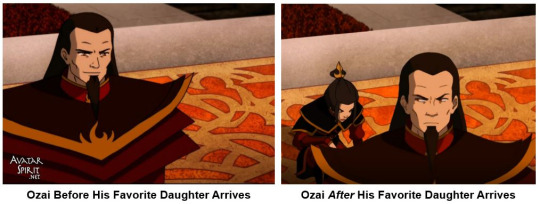
Look at that sequence closely, in particular the change in Ozai’s expression after Azula arrives. Is that the face of a man who wants his supposed favorite around?
Wait. Stop. I know you’re doing it again: you’re thinking about Ozai’s capacity or lack thereof for love, why Azula feels this way or what her ulterior motive is or what psychological disorder is driving her to cling to him like a parasite.
Once again… Relax. We’ll get to that. Just focus on what the Finale is telling us here: Azula wants to be with her father (a Goal), she is scared of being treated like Zuko (a Motivation), and her father is not giving her what she wants (a Conflict).
Does Ozai assure her that he isn’t treating her like Zuko? Does he put his hands on Azula’s shoulders and tell her that that isn’t what’s happening?
No!
He buys her an expensive car to get her to shut up. Azula hasn’t been given what she wants in this scene. “Fire Lord Azula” is not being at her father’s side. Being coronated is not “doing this together”, in fact, it’s leaving her alone. It can be argued that Ozai manipulated Azula in this scene by giving her something she wanted, so how was he able to manipulate her?
By understanding her Goals and Motivations, next of which are revealed in the Throne Room Scene.
Pivotal Azula Scene #2: The Throne Room
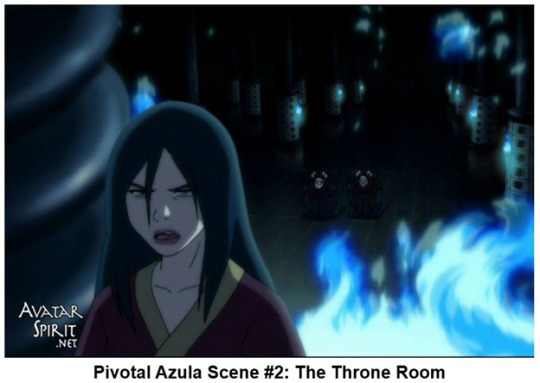
Ever hear the phrase “show don’t tell” in storytelling? Show the reader what the characters feel and what they want? Show what a character is willing to do to achieve their goals? Well, sometimes you do need to tell a reader what a character is thinking in order to make it starkly clear to them, and in the Throne Room scene, we get just that: a clear statement by Azula of what her Goal is, and it is a whopper.
In fact, this stated Goal by Azula is so monumental that it can be considered character-defining. It ties her royalty into her relationship with her father into her being a prodigy into her high standards (“almost isn’t good enough”), even into her struggles to be a “normal” teenager in The Beach. It makes the “Princess” in Princess Azula actually mean something. It makes “Princess of the Fire Nation” actually relate to the Fire Nation.
Azula’s second Goal, as stated explicitly in the Finale, is to be the greatest leader in Fire Nation history. Those are her exact words.
Be something; a physical condition. It requires her to take action, to be active, to accomplish things. It is a Goal.
Azula’s Goal #2: Be the Greatest Leader in Fire Nation History
In the Throne Room scene of the Finale, Azula says that she will be the greatest leader in Fire Nation history. She says it. This is not an interpretation or “reading into” things. The Finale has told the viewer what the Princess component of Princess Azula wants to be when she grows up: the greatest leader in Fire Nation history. This is a Goal; something that can be physically achieved. While it is true that what constitutes “greatest” can be subjective, certainly it involves a combination of reputation and physical accomplishments, especially given the goals of the Fire Nation at the time: conquering other nations and advancing the country’s wealth and power.
That this scene has flown under the radar for so long is mind-boggling. It is akin to asking a child what they want to be when they grow up, only this is a flame-throwing, feudal-era teenager who is being raised to command armies. Look at it this way:
“Little Jimmy, what do you want to be when you grow up?”
“An astronaut!”
“Little Susy, what do you want to be when you grow up?”
“A doctor!”
“Little Princess Azula, what do you want to be when you grow up?”
“The greatest leader in Fire Nation history!”
Azula told us what she wants to be when she grows: the greatest leader in her country’s history. That is a pretty lofty goal that has been tempered by age or experience, something a young person could easily think they could achieve, but then again, maybe it wasn’t so unreasonable for her: she captured Ba Sing Se, defended the Capital from invasion and can bend blue fire and lightning at a young age.
So, why would a princess strive to be the greatest leader of her country versus just lounging around all day? That is for her Motivation to explain.
Azula’s Motivation #2: Her Father’s Expectations + Pride & Belief in Her Royal Title
This Motivation is really multifaceted, but in order to simplify things, it is being tied to her royalty in order to emphasize its connection to the Throne Room scene.
If “being the greatest leader” is a Goal, then the reason why she wants to be the greatest leader is her Motivation.
This is where some speculation becomes necessary. Even though the Throne Room scene stated this Goal very clearly, it doesn’t say much about why she desires this. You have two ways you can approach this question. First, you can cynically assume that Azula is motivated by nothing honorable or relatable, therefore she is closer to a parasite feeding off of the Royal Family, or second, you can assume she is a product of the world she lives in and so is motivated by things that can tell us about the Royal Family, the Fire Nation, and life under her father. Because the former results in no room for growth and change, and is entirely based on psychological theory, this article will assume the latter.
Because there are no clear answers for why she has this Goal in the Finale, I am simply going to list a variety of potential Motivations. Most likely, the answer is a combination of these at the same time:
· Ambition to achieve (like a great athlete striving for excellence);
· Enjoys challenging herself;
· Desires to be someone (famous, notable);
· Internalizes her role as Princess and sees herself as nothing else;
· Enjoys fighting, firebending and military subjects;
· Enjoys politics, ruling and statecraft;
· Excels at her royal role, so enjoys being good at it;
· Believes in the purpose of the Imperial Government;
· Takes pride in Fire Nation history and wants to contribute to it;
· Enjoys having power over people;
· Seeks praise;
· It’s what her father expects of her;
· Believes her father is a great leader and so wants to be like him;
· It’s what’s expected of a Fire Nation Princess;
· Wants to maintain the legitimacy of her family and “prove her worth”;
· If there’s any sort of sexism in the Fire Nation, maybe she feels she needs to work “twice as hard to get half as far”;
· Following the sexism angle, maybe she wants to distance herself from any “limiting” feminine roles;
· And others.
In the Throne Room scene, we are given a hint as to what might be one of Azula’s motivations for wanting to be the greatest leader in Fire Nation history: not being treated like Zuko (i.e. living up to her father’s expectations).
Right before she gives the aforementioned line in the Throne Room scene, she says to Lo and Li that her father doesn’t think she “can handle the responsibility of being Fire Lord”. Perhaps one of the reasons for pushing herself toward ever greater achievements and abilities is to prove to her father that she truly does deserve to be “by his side” and not “treated like Zuko”.
But Azula is also a princess. That is extremely important.
Azula is a member of the Royal Family and is a military and authoritarian leader by default. The Throne Room scene is the chance to inject the Fire Nation into Azula’s character, not just emotional disfunction and psychological dependency. Remember what kind of country Azula lives in: it is full of walking flamethrowers who must be kept in line.
Remember all the warfare in ancient Japan? No? Then take a look at this article, The East Asian Origins of Fire Nation and Its Villains, for an idea as to why the Imperial Government exists and why the Royal Family is very concerned about being successful, and using force and intimidation to do so.
“I want to be the greatest leader in Fire Nation history” is the chance to use Azula to convey broader subjects about the Fire Nation’s politics, history, culture and how they effect someone who is either too young or unable to be what is expected of them: a feared military ruler in a militarized society at 14 years old.
Also note that her goal of being the “greatest leader” was stated after she learned she would be Fire Lord. This means the Goal was not accomplished; the Motivation didn’t go away. Being Fire Lord is not being a great leader; it is simply being Fire Lord. To her, wanting to be the “greatest leader” comes from a much deeper source and, in fact, could be argued as a character-defining Motivation. Along these lines, Azula is not merely Azula; she is Princess Azula at all times, everywhere. To her, there is no “Azula”, but only “Princess Azula”. Her title is her identity.
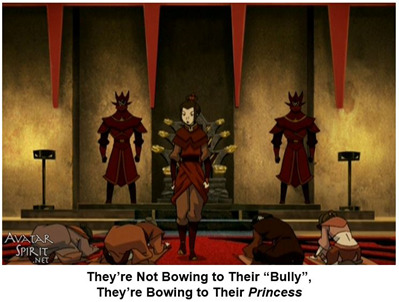
You might have to apply some artistic license here, but you can do so in a way that is both faithful to the source material and builds upon it. For example, while the show was active, there was a description of Azula from the viewpoint of the Fire Nation on Nickelodeon’s website. Note that it sounds very similar to what Zuko said about his sister in Siege of the North: Part 2. This heavily suggests that not only is Azula what her father wants, but also what the Fire Nation and Imperial Government want in a princess.
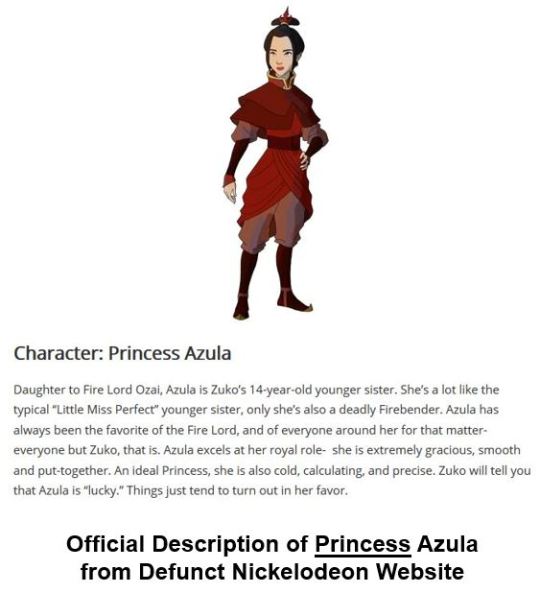
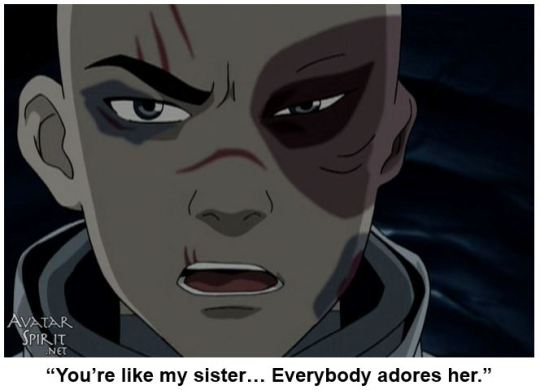
To summarize, Azula’s second Goal is to be the greatest leader in her country’s history and her Motivation for this Goal is a combination of wanting to meet the expectations of her father and flat-out believing and taking pride in her role as Princess. But what about her Conflicts as a result of this Goal? Well, as the Finale demonstrates, she isn’t the greatest leader yet. Once more, some reasonable speculation is required.
Azula’s Conflict #2: She Struggles to Be a Great Leader
Azula felt she had to compel the Captain into taking the ship through the tides right now in order to exert her dominance (this is explained in the Tale of Azula novel). She relies entirely on fear instead of using a combination of trust and fear, like someone who read Machiavelli but wasn’t old enough to actually understand what it was saying; she failed to understand Zuko’s motivations and so he turned against the family; she failed to understand that people are willing to sacrifice their lives for loved ones, or even make stupid mistakes, so she felt personally wounded by Mai; she didn’t know how to handle both Mai and Ty Lee’s betrayal and so lost all faith in her subject’s loyalty; and she banished all of her servants and guards instead of figuring out how to act differently.
If Azula’s father is her “measuring stick” for success, then being at his side and doing things with him is not only protection against “being treated like Zuko” but also a sign that she is doing everything right as a leader in training. Remember that her Goal of being the greatest leader didn’t go away when Ozai gave her the crown; the Goal is coming from someplace deeper.
But Azula begins to doubt herself in the Finale. She begins to feel paranoid and she doesn’t have the life experience and knowledge to tell her why Mai and Ty Lee betrayed her, how to adjust accordingly and what to do differently. She’s never failed before. She’s unsure of what the future will be and she doesn’t have her father to measure herself against. She is not yet a great leader.
She wants to be the greatest leader in Fire Nation history, but how will she become that if she keeps failing and her father left her behind? She wants to be by her father’s side, but how can she be if she’s back in the Fire Nation struggling to have the loyalty of her closest subjects (guards and servants)?
If Azula’s second Goal is to be the greatest leader in her country’s history and the Motivation behind it is a combination of her father’s expectations and pride and belief in her royal title, then her second Conflict is that she doesn’t know how to be a great leader or live up to her father’s standards. In the Finale, she is trying and failing and she doesn’t know what to do.
This leads to the third and final pivotal Azula scene: the famous Mirror Scene.
Pivotal Azula Scene #3: The Mirror Scene
If there were any key emotions during Azula’s breakdown, they were paranoia, fear, anxiety, grief, uncertainty and doubt.
It’s been established by the Phoenix King scene that she wants to be with her father to avoid being “treated like Zuko”. Knowing what happened to Zuko, that must create a hell of a ton of fear, anxiety, stress and doubt within her.
It has also been established that she wants to be the greatest leader in her country’s history. That must also create a ton of fear, anxiety, stress and doubt: will she be the greatest leader? Will she fail? Does she even have what it takes? What if she doesn’t? What if Zuko is better than her? What will her father think of her? What will her country think of her?
During the Finale, she is paranoid about the consequences of disobedient, vengeful subjects who might assassinate her.
She doesn’t know what to do or what the future holds.
She is doubting herself, she is afraid she might fail.
She feels grief, but about what exactly?
There is a pattern emerging from the Phoenix King and Throne Room scenes. You have a teenage girl (remember, that is what Azula is) who is anxious and panicky about being left behind and mistreated by her father; you have a young, military ruler-in-training who has very high standards for herself and is failing to live up to those standards; and you have a member of royalty who is alone, afraid and doesn’t know how to deal with failure or handle what she is feeling.
Remember what I said earlier about ignoring your existing conceptions and feelings about Azula? Well, you also have to ignore the 30-year old voice actress and general appearance of being older. You need to think about the franchise at large.
What were the ages of the main characters: 12? 14? 16? 17 at most? Kids and teenagers, essentially. That is a unique selling point of the franchise—young people going through adversity—and it makes it easier to feel sympathy for them, just as the youth of the characters in the Hunger Games made it more relatable to kids and teens, and allowed adults to feel sympathy as well (adults are the ones who take care of kids and teens).
In fact, the characters of Avatar being kids was an important part of the story: themes of family were critical to Katara, Sokka, Toph, Zuko, Mai, Ty Lee and even Azula (in the end). Therefore, you have to keep in mind the importance of youth to the main cast and franchise at large.
How old is Azula? 14-15?
Do you now see the pattern?
Who do kids and teenagers rely on when they are in trouble?
Who helps them understand their feelings?
Who is supposed to have all the answers?
Who tells them they’ll be okay, they’ll figure it out, they’re not alone?
Parents.
What is Ozai to Azula? A parent. A terrible one by our eyes, but still a parent. Is he there for her during her time of need in the Finale? No. Does he help her understand the myriad of feelings that are causing her to unravel? No. Does he provide guidance as to why Mai and Ty Lee betrayed her and how to learn from it? No. Does he tell her she’ll be okay, to not worry, that she’ll figure it out and she’s not alone? No. Could he have done these things? Yes, because he’s a parent of Azula. Did he? No.
Would it have helped her to have a parent who could walk her through her struggles? You’re damn right it would have. She would have still had a platoon of Dai Lee and Imperial Firebenders to protect her and she’d have been Fire Lord.
But she didn’t have Ozai, either physically or emotionally. She didn’t have a parent to help her. Teenage girl, military-leader-in training Azula couldn’t handle the tidal wave of adversity that struck her, and so she drowned. Lo and Li weren’t parents; they were advisors; subjects. Her servants weren’t her parents; is she going to expose her weaknesses to the people she doesn’t trust and whose respect she must command? Neither were her Dai Lee or Imperial Firebenders (her guards). But she wanted a parent to help her… And she has two.
One of them, her father, not only wasn’t physically present, but also made it clear, in subtle ways, that he wasn’t ever going to be there for her “in that way”; she didn’t jump to the “you can’t treat me like Zuko” conclusion if it wasn’t clear to her that that’s exactly what was happening.
So who is the only other person in the world who can say the things a parent can to Azula? Who is literally her only other parent?
Her mother.
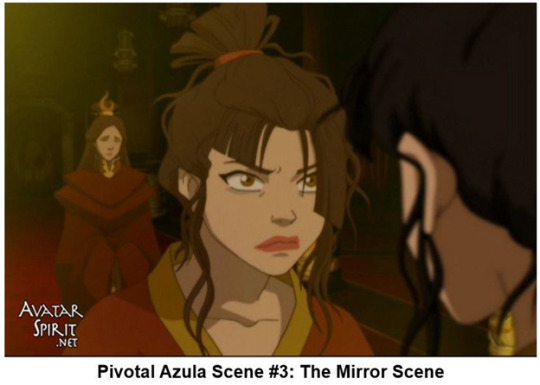
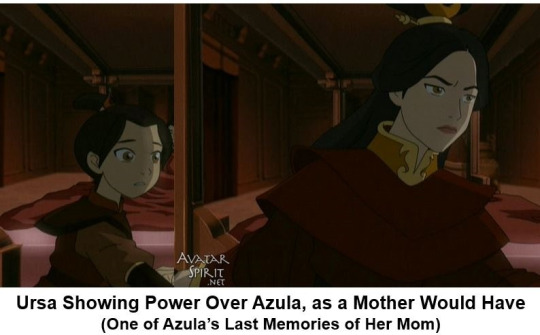
Ursa is not Azula’s conscience speaking to her. Ursa is not a Freudian Excuse. Ursa is not a Shakespearean metaphor for god knows what. Ursa isn’t even a spirit talking to her through the Spirit World. Ursa is, in Azula’s mind, her parent and this reveals Azula’s third Goal.
Azula’s Goal #3: Have a Parent Who Can Help Her
Remember what Avatar is based on: kids and teenagers going through adversity. Ask yourself this: do you believe that all of Avatar was a “lie” and that the “real” Avatar is full of nudity, torture, rape, grotesque violence, “grimdark” themes and the cast is really 18+? I don’t. Work with the source material; it’s what we have, it’s what was made.
Azula is a teenager at the top of a feudal, military government who has extremely high expectations for herself, a father who has her living in fear of being spurned and abused, and who has certain proclivities (i.e. flaws) that are causing her harm. As a result, she is full of fear, anxiety, stress and doubt as a result of her struggle to achieve her Goals. She wants a parent to say and do the things that parents can: sooth their children’s fears, teach them life lessons and help them understand why they’re wrong and how to set them straight.
Azula’s third Goal is to have a parent who can help her, physically be there for her, do and say the things that parents are supposed to in order to make her fears, anxieties, stress and doubts go away.
You always had such beautiful hair?
I wouldn’t miss my daughter’s coronation?
I think you’re confused?
I love you?
Who the hell says those things to someone like Azula?
A parent, or at least Azula thinks a parent would. She might not be able to put this combination of Goal-and-Motivation into precise words, but the teenage girl in her feels it. Her Motivation to achieve this Goal is her feelings.
Azula’s Motivation #3: Alleviate the Stress Caused by Her Goals
Is having a parent the only way for Azula to alleviate her fears? No. She can achieve great things for her country, make marked progress in firebending, be praised by her father, be with her father, have friends to hang out with and, most importantly, she can alleviate her stress by making sure she never fails. If she works hard enough to never experience failure (“almost isn’t good enough”), then eventually she’ll come to believe that she can’t failure, and so won’t be burdened by it. It’s simply impossible… Like an inexperienced person would believe. There is certainly no shortage of highly talented young people in the real world who are both very confident and afraid of failure.
No one wants to live with fear or anxiety or stress; it’s painful and draining. Same for Azula. In her time of great adversity during the Finale, these feelings were not unknown to her; she was already afraid of failure; she was already full of stress over meeting her father’s expectations and becoming the greatest leader; she was already guided by very high expectations. She already lived with fear, anxiety, stress and doubt and it was kept in check by being naturally talented, working exceptionally hard, having the personality for the environment she lived in and never failing. But in the Finale, she was struck by a tidal wave of failure and did not have the knowledge, or support, for staying afloat, like a teenager.
In the Mirror Scene, Azula wants a parent—Ursa, Ozai—to help her with her problems, with her feelings, because she can’t handle them. She is motivated by the fears, anxieties, stresses and doubts of a flawed, inexperienced teenage girl who was raised to be a feudal, military dictator in a rapidly changing world, and is failing.
But as we know, she didn’t find a way to alleviate her feelings in the Finale. Why? Because of her third and final Conflict.
Azula’s Conflict #3: She Doesn’t Have a Parent Who Can Help Her
Could Ozai have helped her? In theory, yes. He knows how to rule through the same manner that Azula is emulating and he’s a 40-50 year old man with the experience, emotional maturity and, most importantly, respect of his daughter. Does he help her? We know he doesn’t. So during the Mirror Scene, Azula retreats to the other parent who could help: her mother, the one who, while not a military leader who rules through fear, can still tell her the sweet, soothing things that mothers are known to say, and say it with the authority of a parent.
But Ursa is not physically present to say those things. Not only this, but Azula doesn’t even believe her mother would say those things, let alone mean them if she did. Why is her relationship with her mother this bad? We don’t know; the show or comics never showed or told us.
However, “my mother thought I was a monster” is not a revelation of Azula’s Goals or Motivations. It is a statement that reveals one of her Conflicts: she doesn’t have a parent who can help her. Either she literally doesn’t have parents who are physically and emotionally present (Ozai), or she doesn’t believe she has parents who are (Ursa).
To repeat, we do not have an explanation for “my mother thought I was a monster”, but ask yourself this: if the “Bear Mother” had actually been standing there during the Mirror Scene, would her words have sounded so haunted, shallow and detached-from-the-moment as if an inexperienced, confused teenager was saying them? Hell no. We’d have gotten the earth-shattering Mother-Daughter heart-to-heart that has eluded the franchise for 12 years (and which likely will never occur).
In the end, Azula did not get the parental support she needed and she didn’t accomplish any of her Goals. She got swallowed by the tidal wave of failure, bashed against the rocks, swirled in the mud and dragged off to an asylum where she will wallow in her misery for all time, never to rise from ashes of her shame and humiliation. Her motivations did not leave her, though; they will burn inside her until the end of her days…
Unless her story is advanced.
The Flaws, Quirks and Personality Traits of Azula
Before this article explains how and why the fandom and Creators misunderstood the Mirror Scene, I want to spend some time exploring Azula’s Flaws, Quirks and Personality Traits.
These are general terms for the variety of additional features that add “depth” to a character. Flaws, quirks and personality traits are separate from Goals, Motivations and Conflicts, but they can cause Motivations and create Conflicts.
For example, if a character wants love (a Motivation) but they struggle with feelings of jealousy (the result of a flaw, quirk, or personality trait), then their Conflict becomes their struggle to overcome this part of their personality when dating their romantic interest. This is a rudimentary example.
Another example would be a husband enjoying watching and hearing his wife scream when she finds fake spiders in the bed (YouTube can reveal lots of example of family members playing pranks on each other). Scaring his wife is not his Goal or Motivation in life; he simply enjoys doing it, and if he is trying to maintain a happy marriage with his wife, this flaw, quirk or personality traits creates a Conflict.
This is how you have to approach Azula’s wickedness in the series. Remember how I said earlier not to think about all of that? Well, now you can.
Smirking triumphantly while Zuko is burned for refusing to fight? Threatening the Ship Captain over a reasonable concern in order to exert her dominance? Throwing loaves of bread at turtle ducks as an 8 year old and still having turtle ducks swim away from her when she’s 14? Shoving Ty Lee to the ground and laughing at her because she upstaged her? Tormenting Zuko over something as awful as his father being ordered to kill him and enjoying it? Smugly hanging Ty Lee over a burning net to make a point? Enjoying teasing and inflaming Zuko? Smirking deviously? Has little respect for others perceived as beneath her? Makes flippant, dismissive comments? Can’t separate herself from her title? Doesn’t appreciate the “softer” sides of leadership (trust, loyalty, love, etc.)? What are these things?
They are Flaws, Quirks and Personality Traits.
Azula’s primary Goals, Motivations and Conflicts are independent from whether or not she feeds turtle ducks by hand or throws the entire loaf at them, or smirks while bullying Ty Lee to establish her dominance, or enjoys teasing Zuko for his perceived weaknesses; Ty Lee would remain a subject to the Crown and Zuko’s problems with his father would not go away.
Azula’s smirking, smug, nasty, sassy, Hyeena-woman persona is what makes her distinct. They are her flaws that create additional Conflicts and exacerbate existing ones. They are the quirks that make Azula a warm body and not simply a set of villainous specifications moving around on screen. They make her feel “alive”. They are the personality traits that separate her from all others in the show.
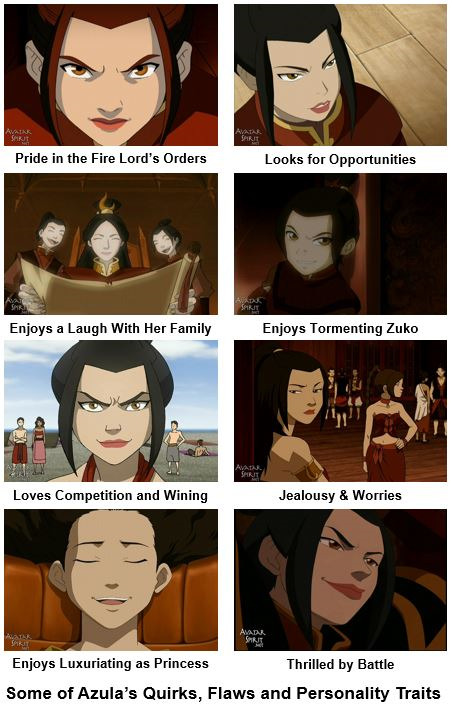
Remember what Azula’s Goals are: be with her father, be the greatest leader in Fire Nation history, and have a parent to help her. For two of those, her wickedness will both help and hinder her.
Not being concerned for peoples’ feelings and having no tolerance for weakness? Makes her able to manipulate corrupt, militant organizations like the Dai Lee. Pushing Mai and Ty Lee too hard and making them resent her? It got her their cooperation, for a time, but it ended up creating the chain reaction of fear, anxiety, stress and doubt that eventually ruined her. Embracing her father’s treatment of Zuko and doing everything necessary to avoid the same? Well, she never really got “treated like Zuko”, did she?
Not having appreciation for trust and love and focusing solely on leading through fear? Makes her able to thrive in the current Imperial Government, but also incapable of adapting to failure. Teasing Zuko? Tormenting him? Perhaps her acting in “evil” ways strained her mother’s relationship with her and lead to the “monster” impression. Now that would be quite the flaw.
Azula’s wickedness both helps and hinders her, and in the case of the Finale, contributed to her downfall. Her wickedness is a flaw. It harmed her. It prevented her from achieving her Goals.
Flaws, Quirks and Personality Traits only tell half the story of a character, and in the case of Azula, they’re not enough to understand who she is and what she wants, and more specifically, they’re not enough to advance her story in the Post-Finale world.
The Distortions of the Mirror Scene
By not paying attention to the two other pivotal Azula scenes in the Finale, the Fandom and Bryke developed a distorted, myopic understanding of the Fire Princess where mental illness, unexplained issues with her mother and violent action against hallucinations comprised the sum total of her complexity.
As a result, just about every piece of the Mirror Scene, from physical actions to key words, along with Azula’s Flaws, Quirks and Personality Traits ended up becoming stand-ins for her Goals, Motivations and Conflicts in official franchise content: The Search and Smoke and Shadow.
By focusing on Azula’s feelings and feelings alone, the Mirror Scene wound up becoming perceived as the pivotal scene for exploring her depth and even became the source of Bryke’s understanding of her when they wrote the comics. Take a look at these panels from The Promise and The Search to see what this means:

Where are her unresolved feelings concerning her father?
Where is her relationship with her country?
Where is her connection to the “Princess” in her name?
This is not to say that Azula’s time in the asylum couldn’t have resulted in her developing such extreme feelings for her mother. In fact, it does make a certain amount of sense: if she is spending her days racked by endless, gut-wrenching shame, humiliation and hopelessness, then the idea of her temporary psychosis from the Finale getting worse is reasonable; it becomes a Conflict for her to overcome.
However, this is not portrayed as what has happened to her. Instead of the Azula from the Finale getting worse, we get the Azula from the Mirror Scene falling off the cliff; all of her complexities from the Finale are absent. Once more, it isn’t that Azula couldn’t have gotten worse, she definitely could have, it’s that Azula’s relationship with her mother alone does not explain the depth of her complexity established in the Finale, which includes her father and country. If she really is suffering from gut-wrenching shame, humiliation and hopeless, leading her to succumb to wacko delusions about her mother, those feelings have to be coming from something already established: her father and country.
If you think I’m cherry-picking, go back through The Search. Scenes like the above happen over, and over and over again with zero mention of anything close to her Goals and Motivations from the Finale. Remember, feelings are not Goals or Motivations; crying about “destiny” and having “proof” in a dream sequence are not enough, especially when the Finale already established the myriad of things she wants, why she wants them and why she can’t have them.
In The Search, Azula is not shown to be motivated by a sense off shame or humiliation over her defeat in the Finale, or sense of responsibility for failing to stop Zuko’s take over of the country. You would expect that someone who wanted to be “the greatest leader in Fire Nation history” would not be dismissive of what their failure resulted in, whether or not her enemies had outside help or not. The closest The Search comes to giving Azula Goals and Motivations separate from her mother is wanting to claim the throne from Zuko over arbitrary reasons of “destiny”. Never in the Finale did Azula espouse “destiny” or a desire to be Fire Lord just for the sake of being Fire Lord; it was tied to her desire to be the greatest leader and please her father. Instead, Azula spends the entirety of The Search lashing out at hallucinations of her mother and wanting to make the voices stop. Not once is her father or country mentioned as Motivation.
Azula does not get portrayed like this unless “love” and “hallucinations” and “being confused” and “my mother thought I was a monster” are taken as the full extent of her Goals, Motivations and Conflicts. You do not portray Azula like this if you properly understand the Mirror Scene as depicting a troubled teenager believing their parent is lying to them (”Don’t pretend to act proud. I know what you really think of me...”) versus her conscience trying to “weaken” her with “love” (”Same as always, Zuzu. Even when you’re strong, you’re weak). In The Search, Ursa is not Azula’s parent in any capacity, past or present, and we are not shown how she has come to feel this way.
You do not make Azula’s relationship with her mother this drastic unless you fully believe that everything about Azula can be acquired from the Mirror Scene and the Mirror Scene alone, and it appears this is precisely what Bryke believed.
In a way, the Azula in The Search is an answers to the macabre question: “How much further out of her mind can Azula go if she believes her mother is the source of all of her problems and every key word and emotion from the Mirror Scene is carried forward?”
To further this point, here are some key lines from the interview in the Sozin’s Comet novelization where Bryke discussed Azula’s “evil”, with commentary added:
“As The Beach and Sozin’s Comet showed, she has a lot of unresolved issues with her mother.”
Yes, it appears she does. Where do they come from?
“She really feels that her mother didn’t lover her as much as Zuko, and this drives her crazy, literally.”
Wait, what? She was already falling apart by the time the hallucination occurred. What about Mai and Ty Lee, her father and her role as Princess?
“There are some truly evil people in the world, but in the case of Azula, her repressed emotions and jealousies corroded her spirit and made her become that way.”
Made her become what way? She’s the Fire Princess; she enjoys being mean and powerful, and she just had a mental breakdown and fell flat on her ass in front of her nation’s capital. What “corroded spirit”?
“And who knows, she might have a chance to heal.”
Heal from what, her villainy? Her personality? Her breakdown? She wouldn’t be Azula anymore?? What are you referring to??
By itself, the Mirror Scene does not reveal Azula’s Goals, Motivations and Conflicts. By itself, it only shows examples of things that give Azula grief and confusion and clearly recognizable human emotions that the viewer can relate to. In other words, feelings.
Feelings are not Goals. Feelings by themselves are not even Motivations; they have to be in the context of wanting, needing, desiring something in order for them to become Motivations.
“My mother thought I was a monster” is not a want or a need or a desire. It is a statement of a Conflict and nothing more, whereas, “My mother thought I was a monster (Conflict) and this eats at my soul (Motivation) because I want my mother in my life helping me (Goal)” is getting somewhere.
Using the mirror scene as a sole reference is how Azula’s throwing of the hair brush in the Finale turns into shooting lightning at water, or her gripping her hair and screaming to reject the words of “love” from the hallucination, or her desiring to literally murder the physical embodiment of the hallucination; it’s because the writers are trying to wring every drop of meaning from this out-of-context interpretation of the Mirror Scene.
It’s how her want for the throne is based on vague, brand new notions of destiny instead of duty to her country. It’s how you get not a single word from Azula about wanting to correct her image in the eyes of her father... Because the Mirror Scene didn’t say any of this; it was all about her mother, love and confusion.
And don’t think this myopic, excessive emphasis on the Mirror Scene and Azula’s feelings was limited to Bryke. Oh no. Nobody is getting off easy.
Take Aaron Ehasz’s comments about his brain bugs for a Post-Finale Azula arc in a hypothetical Season 4, which many fans have found inspiring and also devisive:

He focuses on “pain”, “love”, “feelings”, “change”, even uses the magic word “redemption”. These are all abstract. Where are Azula’s Goals, especially those revealed in the Finale? Where is “I will be the greatest leader in Fire Nation history?” What does she want to accomplish in this Season 4? What will she be doing? Feelings are not enough. Motivations are not enough. There have to be Goals attached to them.
“Azula is in the depths of her abyss” is not a Goal, whereas “Azula is in the depths of her abyss (Conflict) because she wakes up every day with gut-wrenching feelings of shame and humiliation that she wants to go away (Motivation), so she wants her normal life back (Goal)” is, once more, getting somewhere. And better yet: “she will do whatever it takes to end her misery” is the beginnings of a story.
Now take a look at what author Gene Yang wrote when he was asked by a fan if it is possible for Azula to have “happy closure.” What does “happy closure” mean? Well, as someone who now understands Goals, Motivations and Conflicts, you know that it means a character achieving their Goals and no longer having any Conflicts, but what is Gene Yang’s answer?
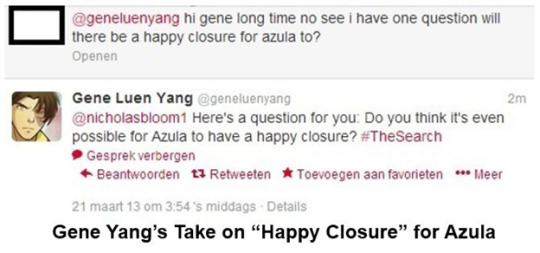
He says it’s not even possible.
Of course it’s possible for Azula to have “happy closure”. Any character can. It’s a matter of them achieving their Goals or losing the Motivation for them. She’s not a robot.
But hold on! Wasn’t Gene Yang just being vague? Wasn’t he only trying to make a point to get the fan to think for themselves? Maybe even hide the plot of Smoke and Shadow?
You could have thought that at the time, but as we now know from Smoke and Shadow, Gene Yang wasn’t making a vague, thought-inducing comment to that fan. He was stating that Azula can’t achieve her Goals or change her Motivations. Remember what her Goals and Motivations were from the Finale: be with her father, be the greatest leader in Fire Nation history, and have a parent who can help her. None of those Goals and none of the Motivations behind them were resolved at the end of the Finale, or by the end of The Search; they were ongoing. We didn’t even find out if they had changed between the Finale and The Search. Now take a look at these two scenes from Smoke and Shadow:

Not even Azula’s mother and brother know what she wants, and in fact, neither do Gene Yang, Bryke, and for the longest time, the majority of the Fandom.
Why can this conclusion be made about the Creators? Because Azula’s Goals, Motivations and Conflicts established in the Finale, and which had not been resolved by the end of The Search, disappeared entirely in Smoke and Shadow.
Without hallucinations, without her mother’s voice giving her haunting assurances of love, without feelings directly attached to the Mirror Scene, there is nothing else inside Azula in the minds of the Creators. Once she runs away into the forest at the end of The Search, after hearing hollow platitudes from her brother, she becomes “weightless… free”.
There are no unresolved issues with her father. There is no goal to be the greatest leader in her country’s history. There is no desire to absolve herself of her failures to prevent the old regime from falling. There is no sense of personal responsibility for failing to stop Zuko and thereby prevent the destruction of the colonies. There isn’t even a relationship with her mother if it can’t be tied to hallucinations.
By placing all emphasis on the Mirror Scene in the comics, everything about Azula became searching for “love” and feeling “confused” because those were the key words used by the hallucination in the Mirror Scene. “Love” becomes just a word she needs to hear (“I love you, Azula” from the hallucination, “You’re still my sister” from Zuko) without regard to who it comes from (supposed to be from her parents) or whether it is actually meant (there is no reason for Azula to believe Zuko, or even seek it from him; he’s not a parent and he’s a mortal enemy responsible for her ills).
There was nothing about one’s duty to their country as a Princess; there was nothing about living up to her parents’ standards, both parents’ standards; there was nothing about becoming the greatest leader in Fire Nation history, and becoming Fire Lord (either via the letter or vicariously in Smoke and Shadow) is not becoming the “greatest leader” to Azula. It simply means being Fire Lord. This is what was revealed in the Finale when she still wasn’t satisfied despite being on the verge of being crowned. And finally, there was nothing about resolving her feelings of fear, anxiety, stress and doubt that resulted from her failures to achieve her Goals during the Finale.
So why did this happen?
On the Creators’ side, it’s impossible to speak for them, but judging by the interview in the Sozin’s Comet novelization, not even Bryke paid attention to the Phoenix King and Throne Room scenes. They became myopic about Azula’s relationship with her mother too, and forgot all about her other relationships and motivations, namely those involving her father, country and self. As a result, their understanding of their “favorite villain”, as they described her in the Art of the Animated Series, became a vacuous, distorted mirage (literally a ghost in Smoke and Shadow) of her former self and her Arc that was begun in the Finale was abandoned entirely.
On the Fandoms’ side, it’s a combination of things:
1) The Fandom had not been “primed” to have their view of Azula challenged, so the “subtleties” of her relationship with her father and country got overshadowed by Ozai donning a ridiculous outfit, Azula banishing people in a blue-colored throne room and “Oh my god, Ursa!!”;
2) The Mirror Scene was “sexy”; it was eye-opening, jaw-dropping; it made you go, “Holy crap!” The eerie violin score was haunting, the voice acting was top notch and it had big, bad Azula on her knees sobbing like a wimp. Naturally, it stood out in peoples’ minds whereas the Phoenix King and Throne Room scenes fell behind the desk, and thirdly;
3) Azula’s relationship with her mom is primarily about feelings. A show as visually stunning and well-voice acted as Avatar is, first and foremost, about inspiring feelings in the viewer. In fact, all stories are about inspiring feelings. The Fandom did not go into the Finale looking to learn about Azula’s complexities, so The Phoenix King and Throne Room developments did not receive the same amount of intense, emotional attachment as the Mirror Scene. Simply put, the hallucination of a mother telling her teenage daughter that she loves her, and that same teenage daughter collapsing into tears over it, is much more heart wrenching and relatable to kids and teenagers than the pressures of ruling a military feudal dictatorship in the image of the Big Bad.
Summary
To understand a fictional character, you have to know their Goals, Motivations and Conflicts. Next, you have to identify their Flaws, Quirks and Personality Traits, which add distinction and depth and provide internal sources of Motivation and Conflict.
Azula’s Goals, as revealed in the Finale, are as follows:
Be With Her Father;
Be the Greatest Leader in Fire Nation History;
Have a Parent Who Can Help Her;
Azula’s Motivations, as revealed in the Finale, are as follows:
Not Be Treated Like Zuko;
Pride & Belief in Her Royal Duties;
Alleviate the Stress Caused by Her Goals;
Azula’s Conflicts, as revealed in the Finale, are as follows:
Her Father Doesn’t Want Her;
She Struggles to Be a Great Leader;
She Doesn’t Have a Parent Who Can Help Her;
The Mirror Scene and Azula’s relationship with her mother are not enough to reveal her Goals, Motivations and Conflicts. The Mirror Scene, by itself, is only a Conflict, whereas the two additional scenes in the Finale—the Phoenix King and Throne Room scenes—provide her other Goals, Motivations and Conflicts that make the meaning of the Mirror Scene clear: a teenager looking for the support of a parent.
Excessive emphasis on the Mirror Scene and, by extension, Azula’s relationship with her mother, have created a distorted view of Azula that has harmed her portrayal in the comics and stymied explorations of her value to the Franchise. Instead of Azula being a feudal military leader-in-training who struggles with both her feelings and Goals, she has been reduced to both a myopic interpretation of the Mirror Scene and is limited to her Flaws, Quirks and Personality Traits, none of which are enough to advance her story in the Post-Finale world.
Closing Remarks: How to Move Forward with Azula
For those fans of Avatar who are curious about what to do with Azula’s Goals, Motivations and Conflicts, and makes use of her Flaws, Quirks and Personality Traits, you have to ask this question: what value can more Azula bring to Avatar?
No individual character will be more popular than the franchise itself, especially a hated villain who might have the ability to change and grow. Below is a screenshot from Google Trends showing the relative popularities between Azula, Zuko and Avatar: The Last Airbender search results. It demonstrates that secondary characters like Azula are nowhere near as popular as the franchise they are a part of.
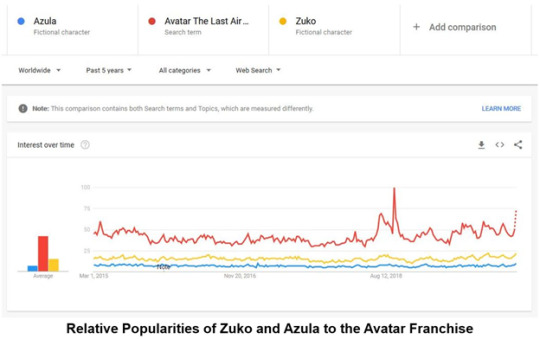
In order to make a character like Azula worth exploring in detail, they have to be made important to both the Main Cast and the Franchise at large. It’s not enough to just have “a” story about Azula; her Goals, Motivations and Conflicts have to be valuable to the Heroes and world of Avatar. There are no hard and fast answers as to how to achieve this, and the franchise has clearly moved on from Azula, but with Avatar being rebooted in live action form, here are some ways to begin approaching this in case the live action version moves into Post-Finale territory.
Azula’s Unique Selling Points
These are the things that make a character fun, interesting and enjoyable to have on screen. In other words, likable. Toph’s cheekiness, for example, is a Unique Selling Point. Aang’s free-spiritedness is a Unique Selling Point. These can also be called the “fun and games” of a character. They are what viewers want to see, hear and feel when these characters appear on screen. For example, if Toph and Azula are going to appear on screen together after Azula is taken out of the asylum, there better be sass, like in Day of Black Sun.
Azula: Um, right. I think your friend just said that genius. And since you can't see, I should tell you I'm rolling my eyes.
Toph: I'll roll your whole head!
So what are some of Azula’s Unique Selling Points?
Blue fire;
Lightning;
Skilled martial artist and firebender;
Royalty;
Intelligent;
Snarky and smug;
Smooth-talking;
Confident;
Female in a militarized society, but who does not eschew femininity;
Makes “princess” associated with power and aggression, not passivity;
Dark subject matter surrounding her (e.g. the unresolved emotions in the Finale);
Determination;
Emotional fragility;
Youth (the kid/teenager themes of the show).
Azula’s Value to the Franchise
This is what makes a character more than just a background character or plot device. It’s what makes them create new fans of the Franchise, add interest, sell product. In other words, add value.
Haru, for example, adds little value to the Franchise because he’s just a regular Earthbender with no Unique Selling Points and his relevance to the plot and characters is over. Iroh, on the other hand, is absolutely full of Unique Selling Points and provides insights into the Avatar world and its characters. His perspective adds value. His abilities add value. His importance to the Heroes adds value.
So what makes Azula relevant to the franchise beyond just being a villain?
She can teach us about firebending through her blue fire and lightning;
She can provide an aggressive firebending female, which ATLA does not have;
She can teach us about the Fire Nation through the eyes of someone who doesn’t appreciate Zuko’s transformative policies;
She can teach us about what it means to be a girl/woman in the Fire Nation;
She can teach us about the Fire Nation’s military, government and history;
She can represent the “old” Fire Nation that Zuko must reform.
Azula’s Critical Relevance to the Heroes
Since any story is ultimately about its characters, Azula not only has to be relevant to the Heroes, but critically relevant to justify deeper exploration. So to which characters is Azula critically relevant?
Ursa, Zuko, and to a lesser extent, Iroh.
As Azula’s mother, Ursa will be implicitly concerned with her daughter’s well-being regardless of how us fans feel; as a young member of the Royal Family who can firebend, she is relevant to the Royal Family’s continuation, and by extension, Zuko’s legacy; and as the sister of Zuko, she is Iroh’s niece, in other words, family.
Essentially, if there is any drama surrounding the Royal Family in the Post-Finale world (and how could there not?), Azula is a fundamental part of it. I call this the “Royal Family Drama Triangle”.
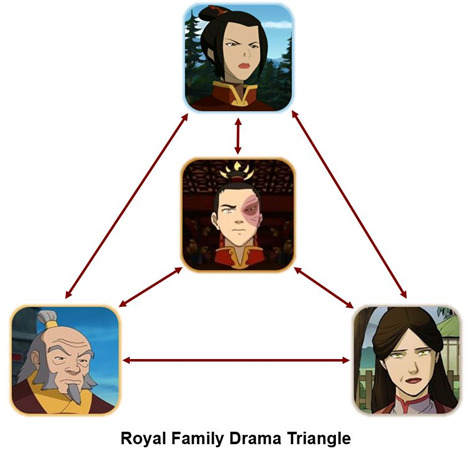
Azula’s Critical Importance to the Plot
Azula must also be essential to both resolving the Primary Conflict of the story. This forces the viewer or reader to implicitly care about Azula’s Goals, Motivations and Conflicts since she impacts the fate of the Heroes directly.
What are some of the problems that Azula can be critically necessary in solving? To begin answering this question, you have to sit down and think about what kind of problems the Heroes would face in the Post-Finale world. This article series, How to Develop Avatar’s Season 4, provides one such scenario.
One way to answer this question is to look at the unchanging aspects of Azula’s character, the thing’s that don’t go away whether she is a villain or not, and these are: 1) she is a young, firebending member of the Royal Family; 2) she is a member of the old regime that Zuko must reform; and 3) she is Ursa’s daughter. This suggests that the type of plot that Azula can take a major role in is one where the Fire Nation and Royal Family are at the center. Princess Azula of the Fire Nation might not care about the rest of the world like Zuko, but certainly she will care about the Fire Nation and its Imperial Government.
Some of the specific problems in the Post-Finale world that Azula can help solve:
Quelling unrest in the Fire Nation over Zuko’s policies;
Stopping a rebellion against Zuko and the Imperial Government;
Saving the Royal Family from assassination/coup (i.e. eradication);
And others if you can come up with them.
How to Develop an Arc for Azula
Finally, how do you go about developing an Arc for Azula in the Post-Finale world? Remember that to understand a character you need to identify their Goals, Motivations and Conflicts. This also applies to creating a character, but when it comes to creating an Arc, you have to add in the Epiphany.
A character’s Epiphany is simple to describe, but difficult to execute: it’s how they grow and change in order to either achieve their Goals, or lose their Motivations and move on in life. The Epiphany is the result of the character’s journey to achieve their Goals combined with their Motivations, Conflicts, Flaws, Quirks and Personality Traits. It is, in essence, what the story is all about. For example, Zuko did not arrive at his Epiphany easy and his decision to betray Iroh in Crossroads of Destiny was not a random step backwards: it was the result of everything about him. An Epiphany for Azula would undoubtedly be complicated and multi-layered, probably much, much more so than Zuko’s.
To begin developing an Arc for Azula, you first have to identify what remains of her Goals, Motivations and Conflicts from the Finale when the story picks up with her in this new Post-Finale story. Remember that she suffered a mental breakdown, was humiliated in the eyes of her nation and has been locked away in an asylum for some length of time.
Next you have to devise a new Central Conflict that drives both her and the Main Cast through the story, something that requires all of their actions to solve. Then you have to establish her new Goals, Motivations and Conflicts in relation to that Central Conflict and the Post-Finale situation she faces, and finally, you have to put her in situations that test her, make her think, challenge her values, that make her change and grow. How you do this is up to you, but her are some pointers:
Always think about her Unique Selling Points. Blue fire? Make her ability to produce blue fire important to the story and not just a thematic decision. For an idea as to how to tie blue fire into the Avatar world at large, see the article, The Science and In-World Reason for Azula’s Blue Flames.
Azula was locked in an asylum? Make it have lasting effects on her that she struggles with. She is royalty? It better be more than just a title, but responsibility and a part of her personal code. Snarky, confident, intelligent and brave? There’s a lot you can do with someone who doesn’t shy away from danger and enjoys infuriating people, especially when they have the literal firepower to back it up.
Always strive to make her add value to the Franchise. She is a female firebender, something that ATLA has a dearth of. This is good; make her femaleness mean something. Along these lines, she is a great opportunity for a “Female Power Fantasy”. Just ask R.F. Kuang about it. She is also not the victim of circumstance or the actions of others as many characters in Avatar are. This gives her a different type of change and growth story compared to Zuko’s.
Use her to talk about the Fire Nation’s militarized culture, the same culture that “pure heart and unquestionable honor” Zuko somehow has to change. Use her to reveal the Fire Nation’s history and politics as it pertains to Zuko’s rule without going into “Info Dumps” since, as a princess, Azula would naturally be concerned with those subjects. Also use her to help advance Avatar’s East Asian themes. The fact that Azula is a feudal leader-in-training and female can give you a lot of material to work with (east Asian origins article).
Maker her critically relevant to the heroes. Find legitimate reasons for why Zuko, Ursa, Iroh and even members of the Gaang would care about Azula’s thoughts and feelings; if they care we care. Don’t think this is possible? It is definitely possible.
And finally, make Azula critically important to the plot. She cannot be a side character; she is too loathed and hated and has too much bad blood with the Gaang for her presence to be tolerated without some pressing need for her to be around. Whatever role she takes, it has to be big. It has to be obvious that Azula’s involvement is required. The Gaang has to think, “Well, damn, we need Azula’s help.” Zuko has to think, “I hope she makes the right decision and helps me. I know she can.” Iroh has to think, “I hope my niece isn’t killed.” Ursa has to think, “I want the love of my daughter. I want my daughter back.”
In short, you have to make Azula important.
Remember: her Arc in the Finale was not finished. It still can.
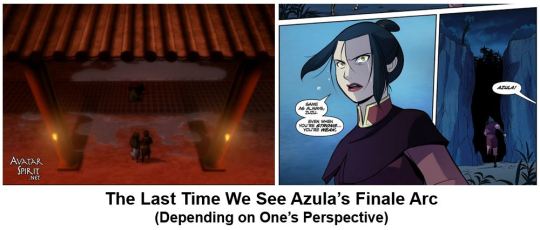
452 notes
·
View notes
Text
the weak point, where we will heal
Chiron in Aries: I feel: defeated, I have no voice, I can not speak. I feel like having to battle everyone around me to prove me. I am not enough, authority challenges me. Am I aggressive for no reason? Am I a mindless hot head and weak in the wrong moments? Where is my idendity, who am I really? I need to prove it to everyone, especially myself. I will heal: Innerly. I am strong and I can speak without backing down, I will be brave for myself and fight for what’s right. I finally know my character.
Chiron in Taurus: I feel: worthless, I have no worth and I don’t feel secure. I crave stability, will I find it in goods? Will I find it maybe if I don’t move and stay the same forever? I need ressurance, I am scared and can’t make any steps further. I will heal: by looking past the face, I will dare to look constructevly at my life, I will work for stability, I can feel secure in myself because I can provide for myself, so there is nothing to fear anymore. I am beautiful and good.
Chiron in Gemini: I feel: stupid and overbeared by all the impressions and informations I get. I am scaref to talk. My believes and views are challenged. I can’t make any sense of it, I am scared to speak my mind and unsure about everything. I have difficulties interacting with my fellow human beings, my mind can’t stand still, I am unable to focus. I will heal: and finally sort out my feelings and ideas. I will find confidence and ways to clean up my thoughts and will see the benefits in talking with my fellows and appreciate their opnion. Changing my mind is part of the progress in life, I feel joyous and happy when intellectually challenged or stimulated.
Chiron in Cancer: I feel: abandoned and unloved. Where is my family, where is my mother? I want a family that functions as a saving harbour but I feel left out and mistreatend. Home is hell and I am part of it. The family generational curse is out to get me. I am afraid I can not form a healthy family myself later on. What is a ‘normal’ family anyway? I will heal: with my heart. Normal is subjective and I am not part of the grudge that seems to hold my family in a tight grip. I can choose my family myself, I am loved even when I doubt it and I need to remind myself. I will transform my pain into a healing hand that touches damaged souls.
Chiron in Leo: I feel: like a disgrace to myself and everyone else. I feel embaressed and I need to hide myself. I am too much, my love, my joy, my presence. I am shy and don’t want anyone to look at me: what if they hate me? Someone spoke too harshly with me and now I am scarred. I will heal: With my inner child by side. I am aloud to enjoy life and life out my passions. I am born to be looked at; everyone is unique in their own ways and I am too. The right people will appreciate me and I need to appreciate myself as well. I see my worth, I am glad I was born because I see the pupose of my life benefitting different situations and people.
Chiron in Virgo: I feel: exhausted. I am born to work and serve, but my body is aching. I see the negative in everything first, I am nitpicking myself and everyone else. I am not allowed to rest and enjoy. There is a mess around me, there is a mess inside me: my life is a mess, I need to clean up my whole existence. I will heal: by opening up to love and warmth. I need to feel the love vibrating in the world I am on. I need to get in touch with my soul, my aims and pupose. I need to know the pin points of my life, everything else will solve itself later on.
Chiron in Libra: I feel: that I need to be always with someone, or do I feel alone? I give myself in into shallowness and have diffeculties forming meaningful relationships with my surroundings. I want to experience love I need to interact with someone because they need to fill the void inside of me. I see mirrors reflecting everything I give away from myself. I am not myself, I will change myself completely. I will heal: by realising that there is a connection between me and other people. I click with them and by helping them they help me. I am not shallow, the peoples are mirrors reflectig what I need, if they are wrong for me, what vibe and sensation do I give off? I can find solitude in myself as well, no one else is needed to give me the feeling of meaningfullness, relationships are an symbiosis.
Chiron in Scorpio: I feel: cursed by the world, powerless. Since I was born someone or something is out to get me. Leave me alone. My inner being is wrong and feels like it can’t fit in, there is a deep, deep trauma that happened once that is haunting me now. I doom myself for being born, I fear losing eberyone, no one is allowed to come near me - I feel evil and wish evil. I will heal: with my whole heart and soul. Nothing is out to get me, I am not cursed, I did nothing wrong, nor in my past, this is a way of shaping who I am there is a reason behind all of this but I am not being punished. I am alright with who I am and I am not scary, nor evil, or a monster that was formed by being hurt and alone.
Chiron in Sagittarius: I feel: lost in life and I fear having it lived meaningless. I feel pressured into finding a meaning and I want to achieve my dreams but it seems everything is getting out of hand. There are no roots holding me, I was tricked into false believes; my believes were belittled and killed. My soul feels restless and I need air to breath. I will heal: by accepting the cycle of life and realising I have the choice to create my life as I want. There is freedom and I can compromise between the rules. I will realise that there is a pupose in finding the purpose: the way is part of the destination. I have time and I don’t need to fear the future.
Chiron in Capricorn: I feel: powerless and stoic. Nobody sees my value and my meaning, I can’t really find my place in society. I feel underappreciated and I always have to work extra hard to hear a true ‘well done’. Do I need to keep up an image? A mask I put on as soon as I leave the house? The future isn’t bright; the future is dark and meaningless. I will heal: by being my own authority and giving me the respect and recognition I deserve. I know my true self and I will align my destiny with it. I know I’ve done well and when times comes they’ll see. The future is bright because it is directed by me.
Chiron in Aquarius: I feel: Alienated and too odd. Evryone wants to be unique but I feel too eccentric to be part of society. I am left alone with my thoughts and visions, I will act as normal as possible to have friends and a loving community. I want to get close to people but i fear them nontheless. I will heal: by admiring my inner core and coming i touch with others. We will earn from each other and appreciate and love our differences; the inspire and fullfill us eventually. I will find community, I will create a place of belonging for everyone, my unique way of seeing things will benefit my community. It will please the void inside me.
Chiron in Pisces: I feel: thrown out in the dark, helpless and overwhelmed. The world is cruel and love is a waste, I feel unbothered, untouched by it. There is nouniverse to guide me, I feel made fun of by it, so I will be equally as cynical and cruel to the world. I am the victim and need to be saved, someone please show me purpose and light. I will heal: by loving unconditionally through and through. Only by opening up and giving yourself the chance to be one again with the world you will feel love and light. The endless, devilish cycle of darkness will end, you will shine brighter than ever before.
#i have so much work left that i need to do for university im about to cry this summer is CANCELLED#chiron#own#mine#chiron in the signs#chiron in aries#chiron in taurus#chiron in gemini#chiron in cancer#chiron in leo#chiron in virgo#chiron in libra#chiron in scorpio#chiron in sagittarius#chiron in capricorn#chiron in aquarius#chiron in pisces#aries#taurus#gemini#cancer#leo#virgo#libra#scorpio#sagittarius#capricorn#pisces#astrology#zodiac
5K notes
·
View notes
Text
Hellblazer Issue #6
While I have read all of this before, I am trying to look at this, in some ways, like I am seeing it for the first time. I’m trying to bring out some of the initial, raw thoughts I had when I had read it the first time.
In keeping with the theme of showing the dark sides of society in these early chapters, it was only a matter of time before the subject of racism and white supremacy came up. This is such a tricky subject to approach no matter what medium is used (comics, novels, plays, TV, etc), and you could argue that it isn’t handled in the most…graceful manner. However, it is good that this is addressed in the series. These dark sides of humanity heavily characterize John’s world; parts of society that a lot of the more privileged members prefer to not see. For John, who sees the worst the world has to offer, these issues are all around him; loud, unavoidable, and heavily tainting even the brightest of moments. John is a cynical man, and it’s not hard to see why. Sadly, this is an all too real reflection of the real world.
I think that growing up the way he did and the area of London he lives in allows John to see a lot of the problems that the upper class (the snobs of the world) and most politicians choose to ignore and puts them front and center; hate crimes, crime just in general, poverty, prostitution/exploitation of women, and the effects this sort of environment has on the young people who can’t escape it. Now, I have never been to London, or Europe for that matter, so I’m not sure if this is just an exaggeration of what the area is like; Delano exaggerating the poverty situation in this area for story-telling purposes. Therefore, I’m not sure how accurate my assumptions are surrounding how “real” this portrayal is of the time this series takes place in. But, I did grow up in another big city; Chicago. And using what I know from life there, I can say that issues like these in certain neighborhoods and projects in and around big cities are very real and very hard to properly impress upon one who hasn’t experienced life there just how very dangerous and terrible they are.
When I left Chicago, I was stunned when I found out that, for people outside the city, gun violence and arson weren’t a normal part of life. Gang activity, using techniques to ward off pick pockets, and knowing which bakeries were fronts for drug smugglers weren’t common knowledge or part of everyday life. It honestly blew me away to see the reaction people had in the other parts of the Midwestern United States I have lived in when someone would go missing or get busted for using meth; the whole town would take it very personally. But for me I felt almost nothing; one person went missing here, but in Chicago, at least 4 people went missing, three died from a drive-by, and the mortician I’m friends with buried two bodies in one casket (one hidden below the other) in order to hide a murder victim who was taken out by the mob (I wish I was joking). So, suffice to say, as sad and disturbing a world John lives in, exaggerated or not, it feels strangely real to me. It’s in big cities like Chicago and London that I think racial violence gets particularly dangerous (don’t quote me on that. But the amount of people who die for being Hispanic/black in Chicago via gun is staggering). Big cities might be seen as colorful due to the mix of languages, ethnicities, and cultures, but it’s also because of this prejudice is often on full display. The more reasons there are to “other” people, the more people will find a way to do it. And it’s a terrible shame. I mean, there’s no reason for that crap. I mean, is it really so hard to at the very least be respectful to each other? SMH
So! That’s just a little bit on where I’m coming from/what’s effecting my reading experience! On to some thoughts!
Aight, well the comment about the Ralph Steadman painting, as it turns out, is not an exaggeration. I looked that shit up and, honestly, he’s not wrong.
I liked that they described creating corruption and as a demon’s real art. It helps hammer home that the corruption and darkness in the hearts of people are a demonic domain which brings the hellish reality in which John lives to life. Very nice.
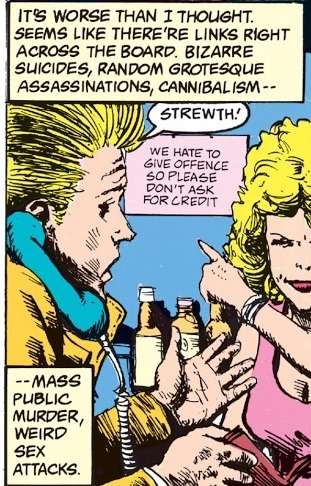
I love that “weird sex attacks” is in the same line as suicides and cannibalism. Something about that made me double-take.
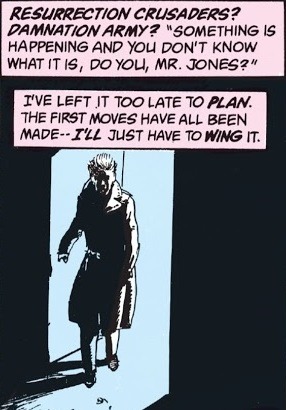
Nice Bob Dylan reference
Am I the only one that thinks Zed’s hair is weird? Era appropriate or not, I still think it’s weird.
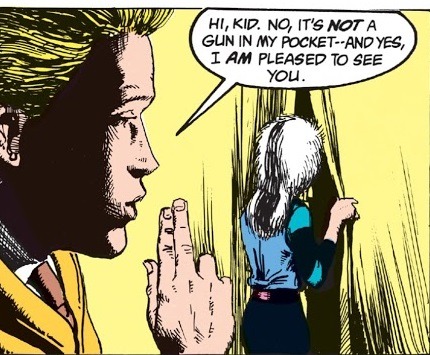
Smooth John…very smooth.
I’m not going to lie, I snorted when I saw what Nergal did to those racists. There’s something poetic about forcing people who unwilling to have empathy and work with/understand others be unable to escape being together. Very nice descriptions of his process in creating the bigot-abomination. Also loving how Nergal is characterized here. He is truly gross. Just…the sewer demon orgy. I was not prepared for that, but I feel like I should have been.
When they show the abomination leaving the sewers, something about the writing there made me think of The Mob Song from the Disney version of Beauty and the Beast. Anyone else get that vibe?
Now, as far as John and Zed go, I’m not sure if I’d call them a couple. Seems inaccurate. Would this be more like FWB? I mean there is clearly trust there, but we don’t see a lot of depth beyond that. I mean, chemistry? I’m not sure how to say. Not saying it’s bad or anything, but nothing that says “they so cute” either. Maybe this was intentional.
I fucking love Ray. He is such a sweet man. Dude he just…he deserves better. He really does.
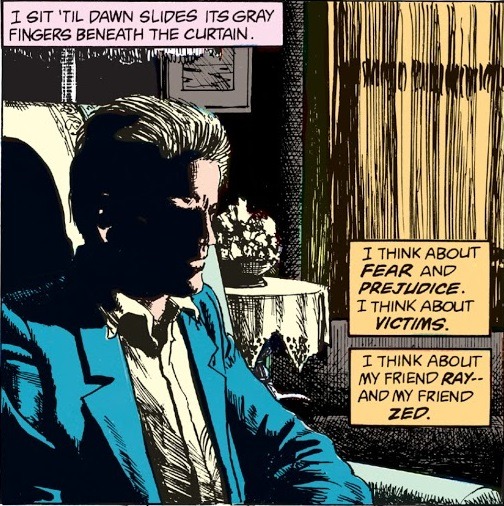
Also, once again, freaking love the cover art. 10/10.
Words I had to look up (also, for the derogatory words I include below I mean no offense; these were honest to God words that I didn’t know the meaning of and saw for the first time here. I figured, based on context, they were not good, but I didn’t really know the meaning. I wanted to share that part of my experience, so I included them here):
dole- benefit paid by the government to the unemployed (familiar with it, but never seen it in that context before so I was confused)
yid- derogatory word for a Jewish person
wog- derogatory word for anyone who is not white
fug- warm, stuffy or smoky atmosphere in a room (this is my new favorite word)
strewth- interjection, expresses surprise. I think it might be something akin to “fuck!”
11 notes
·
View notes